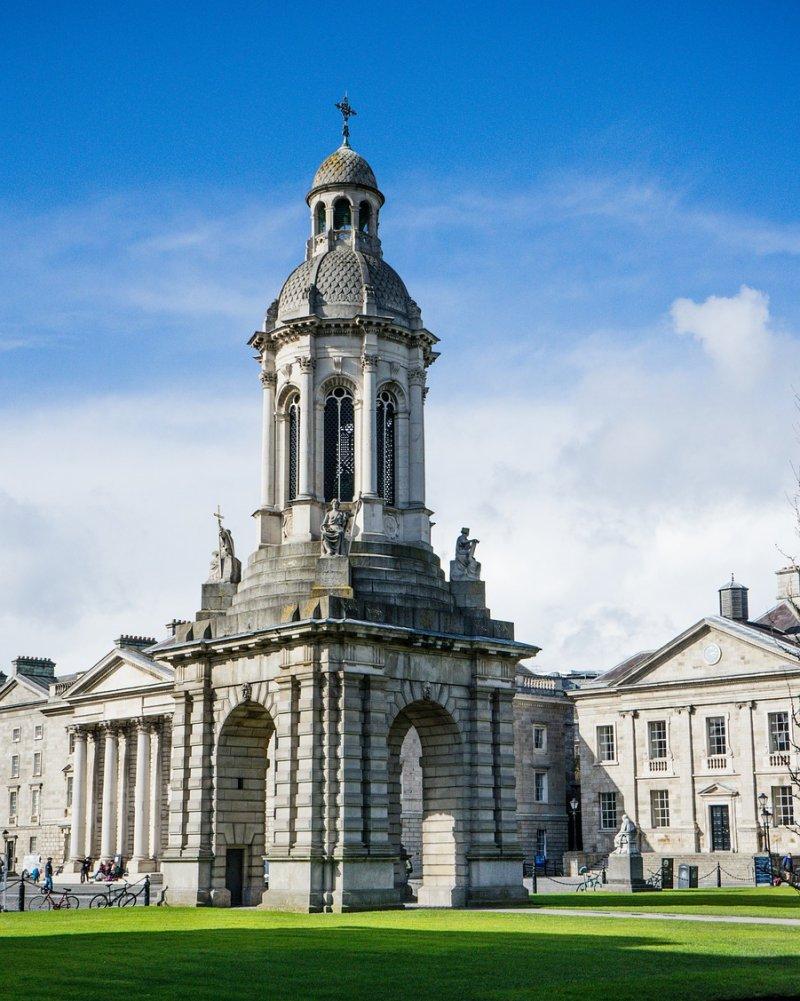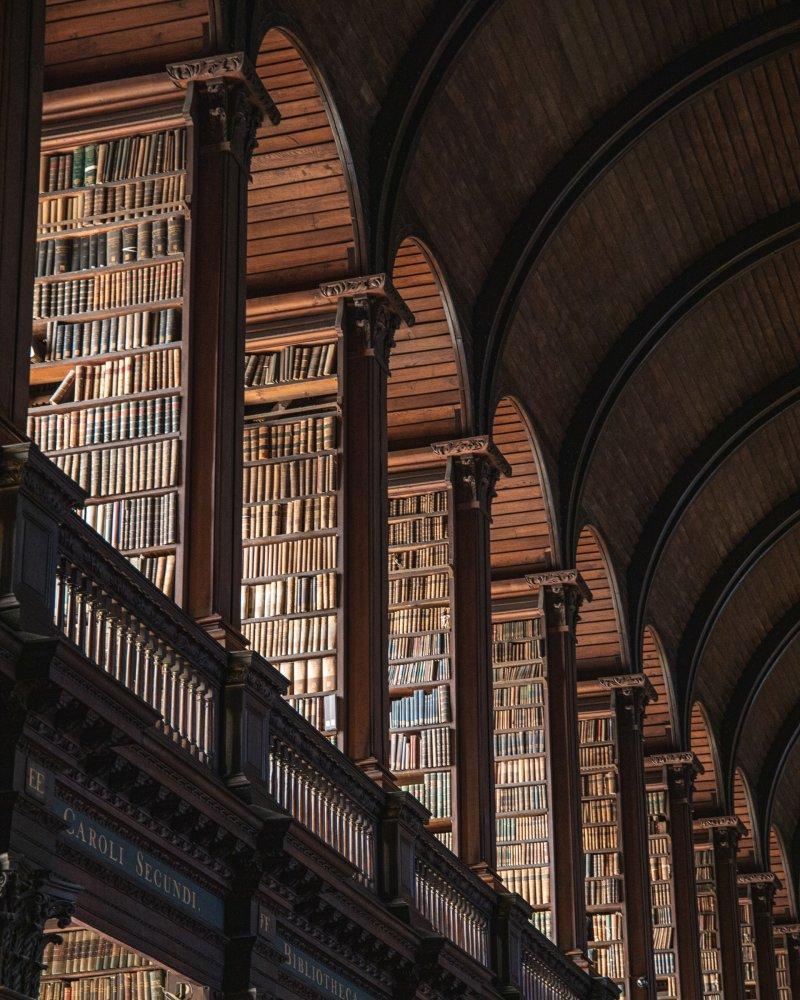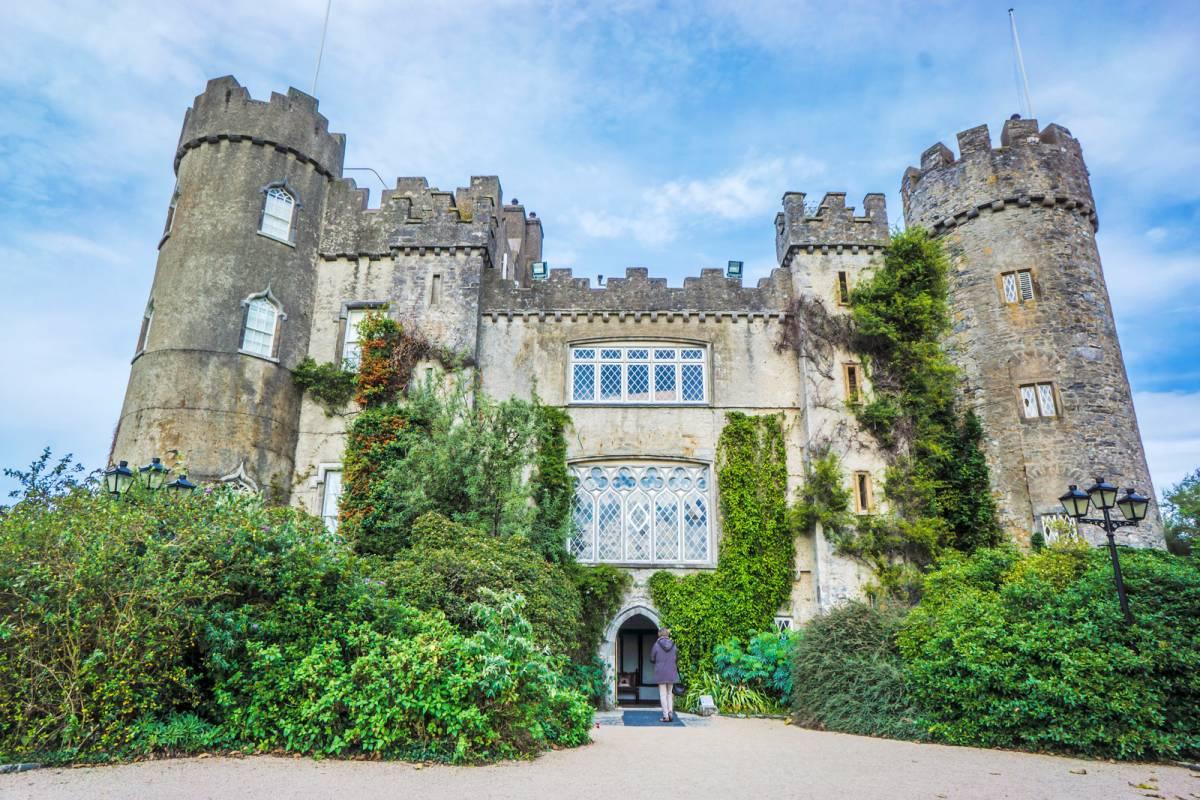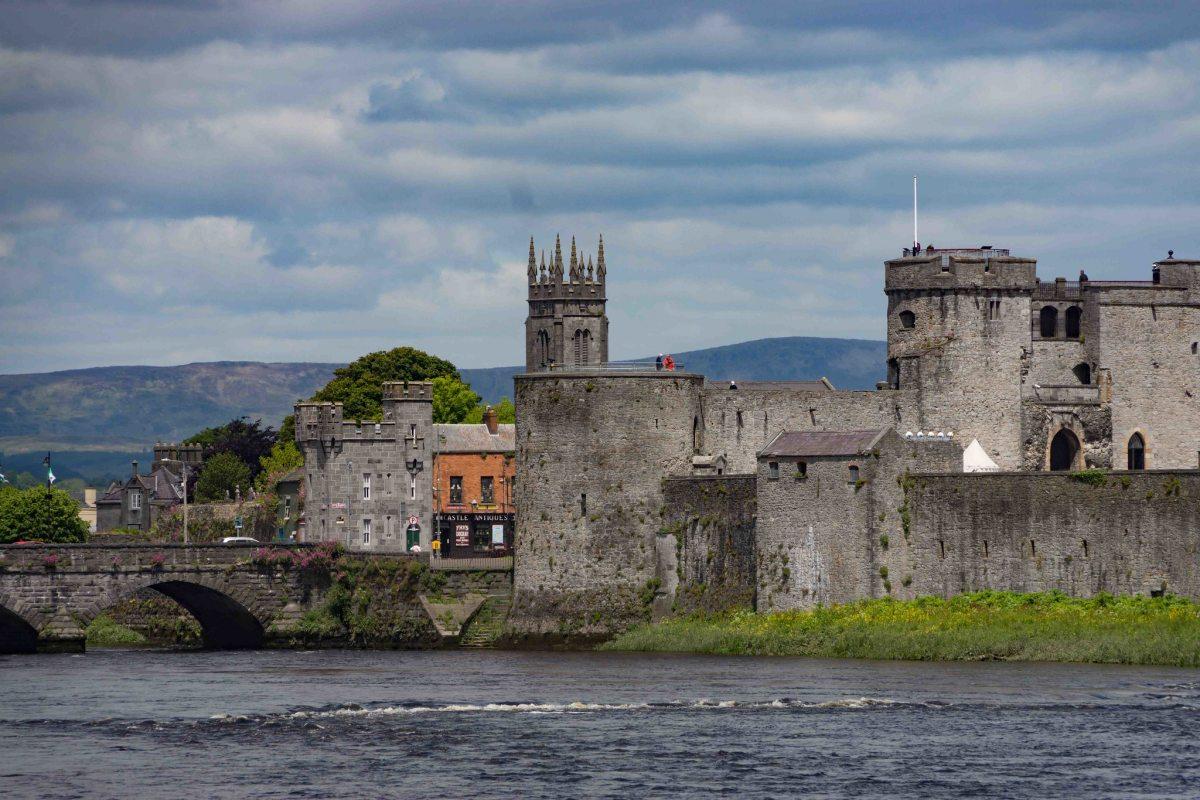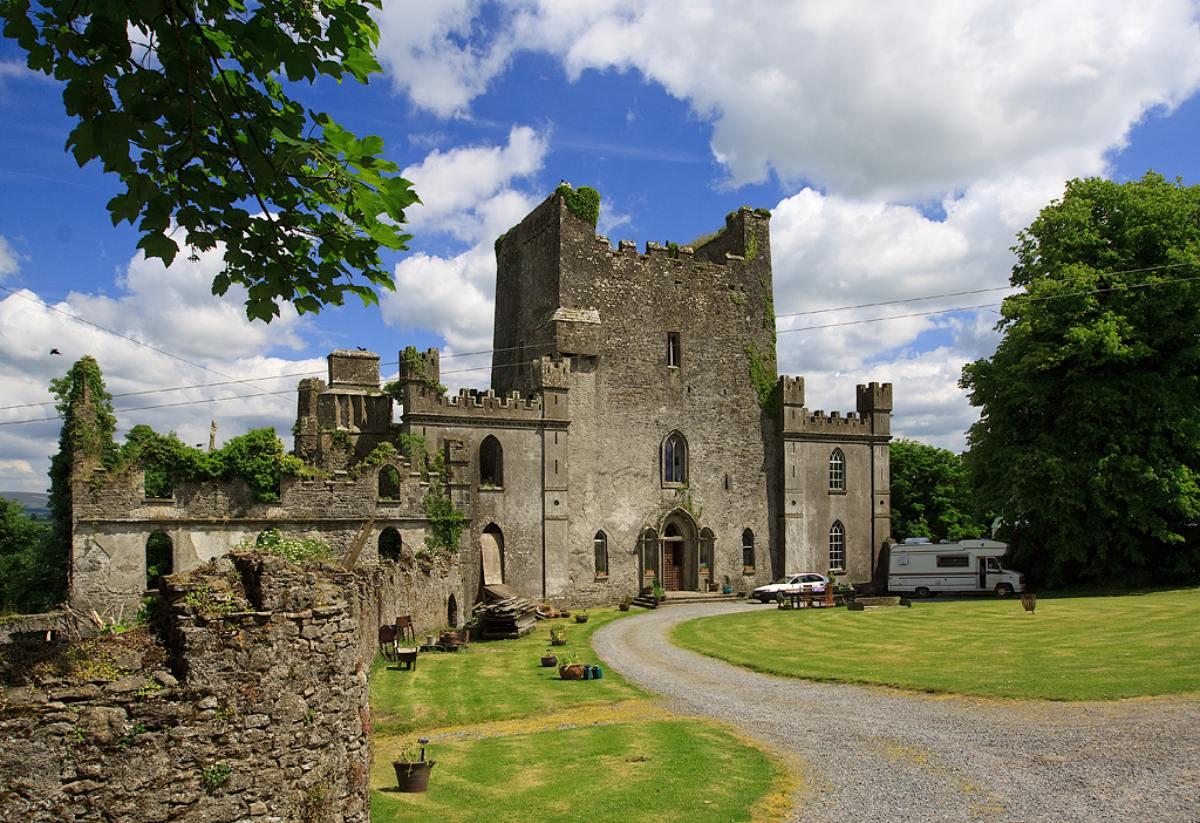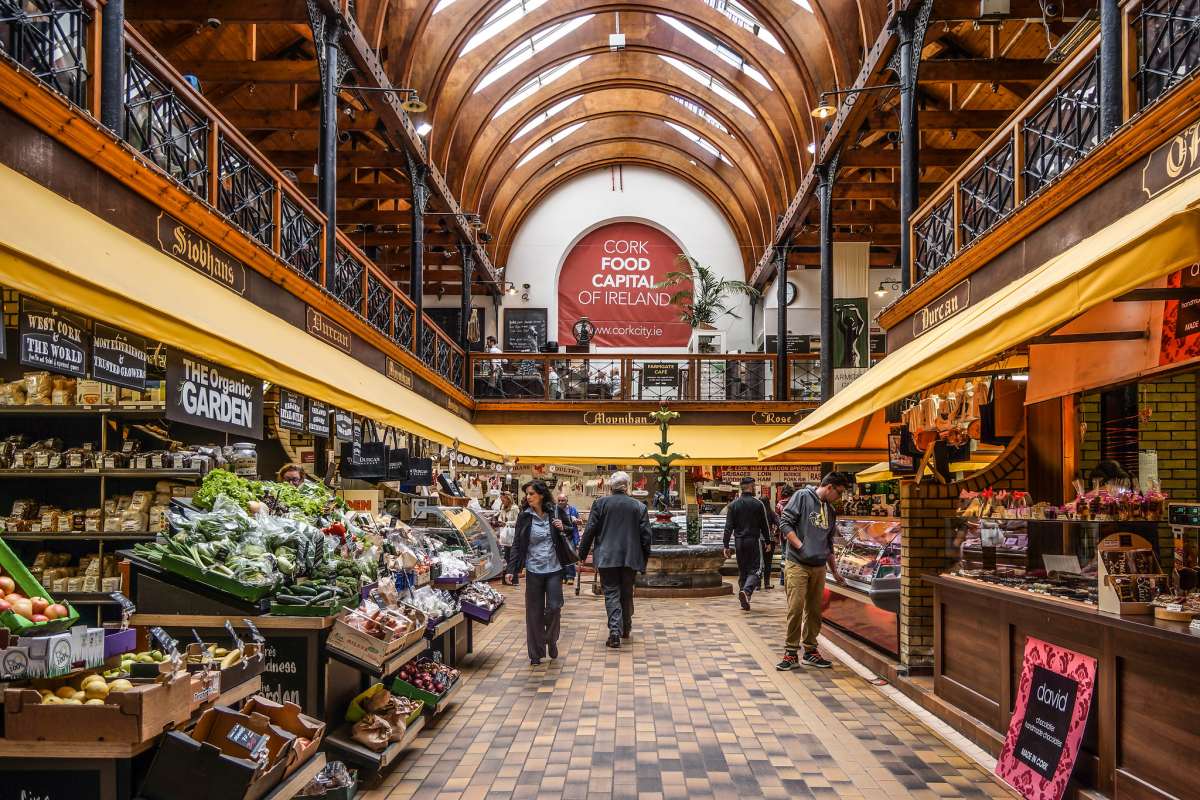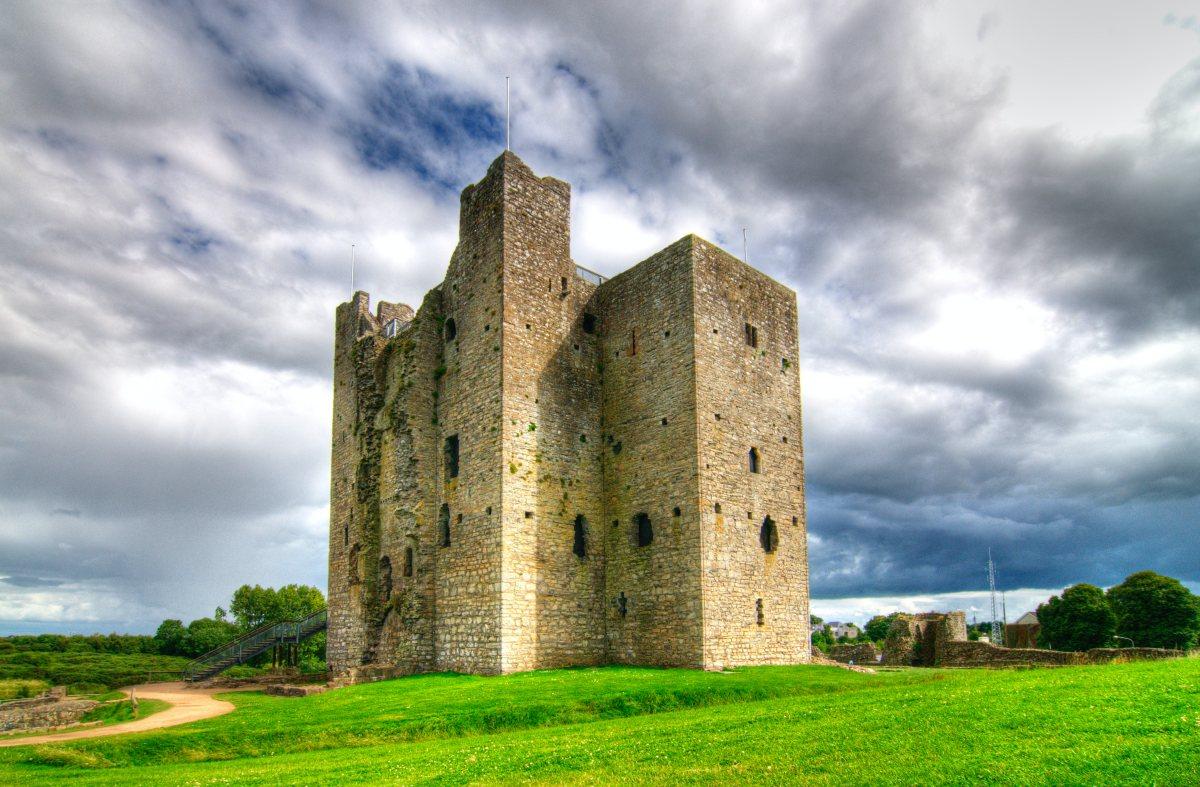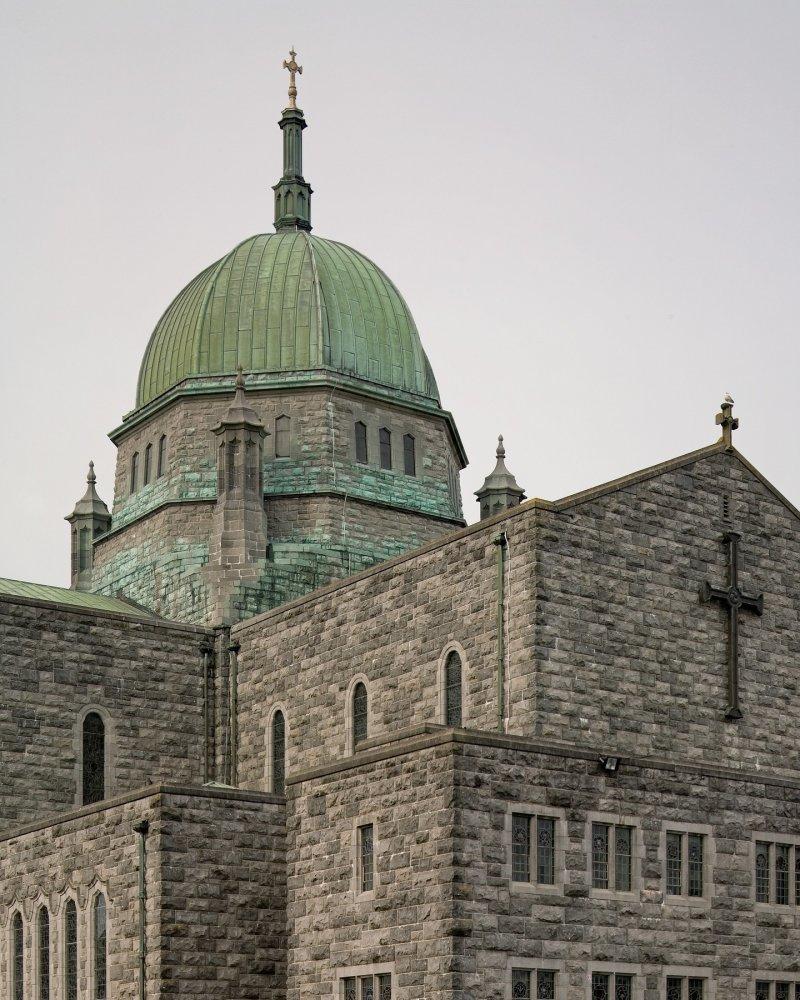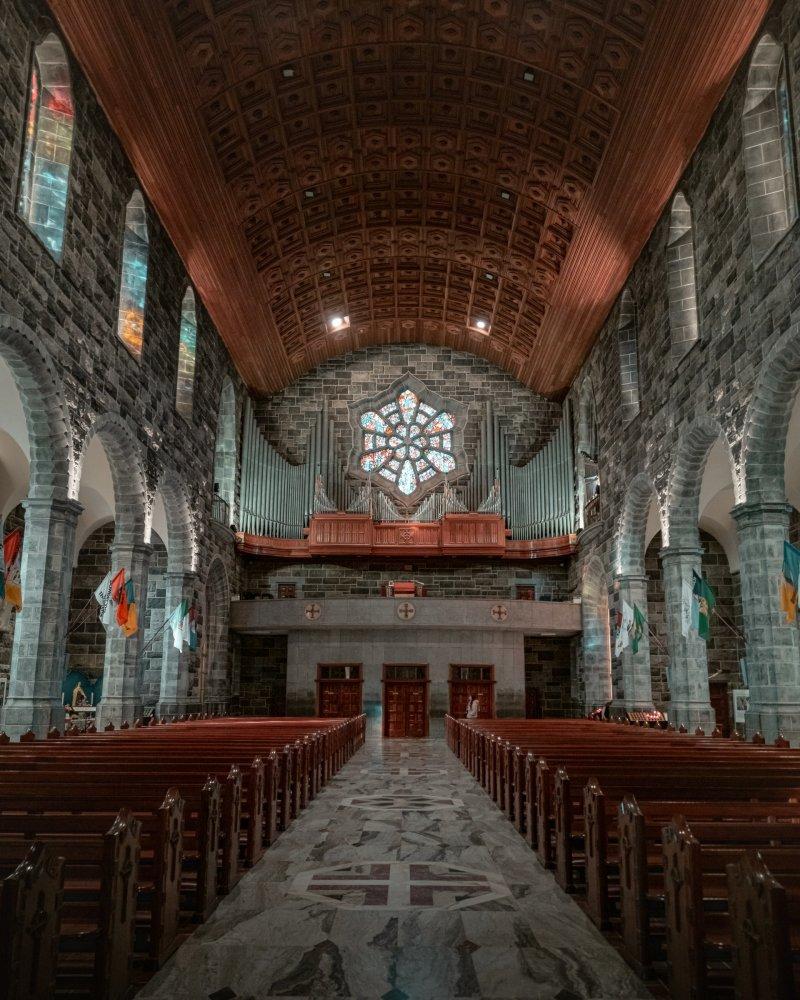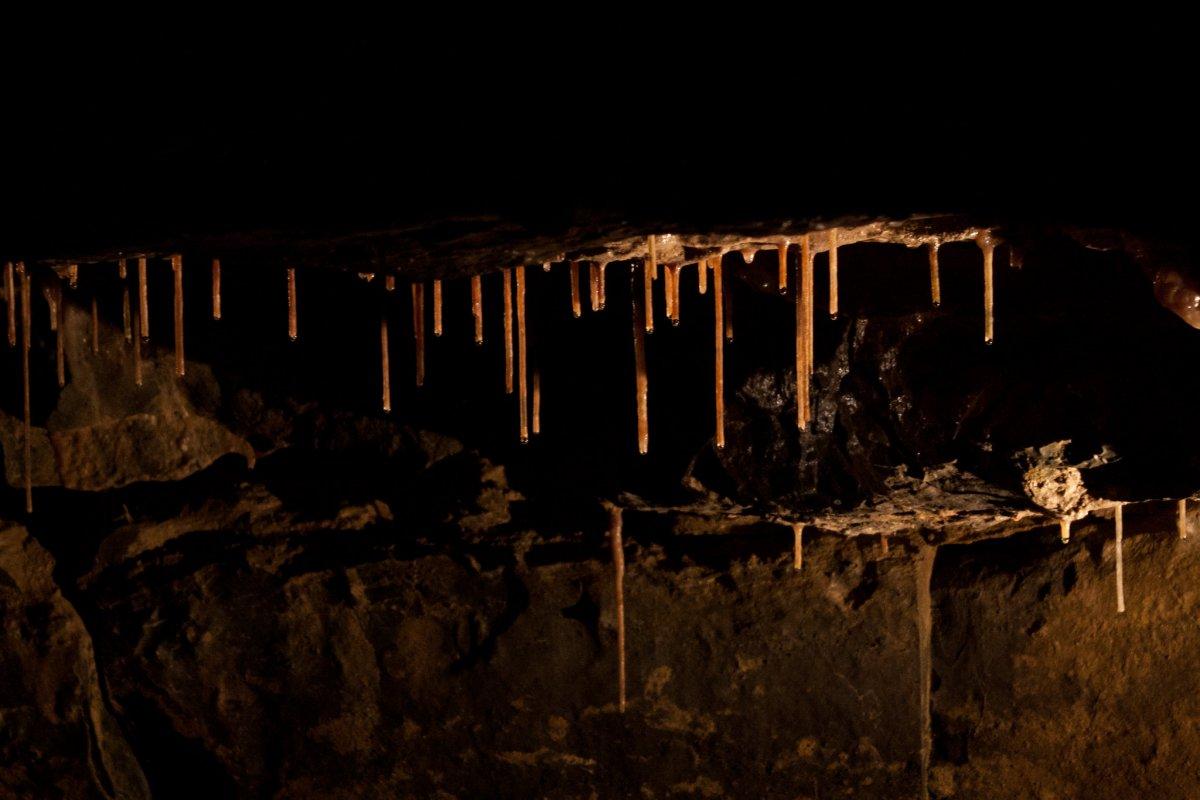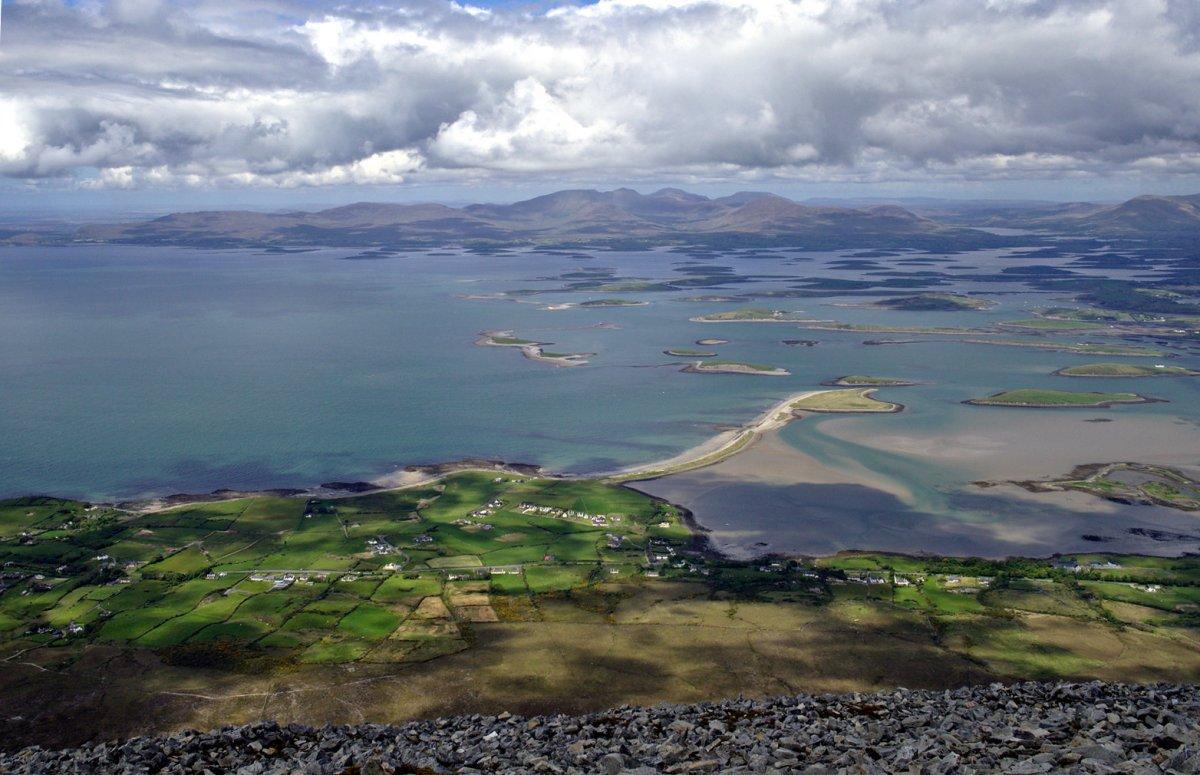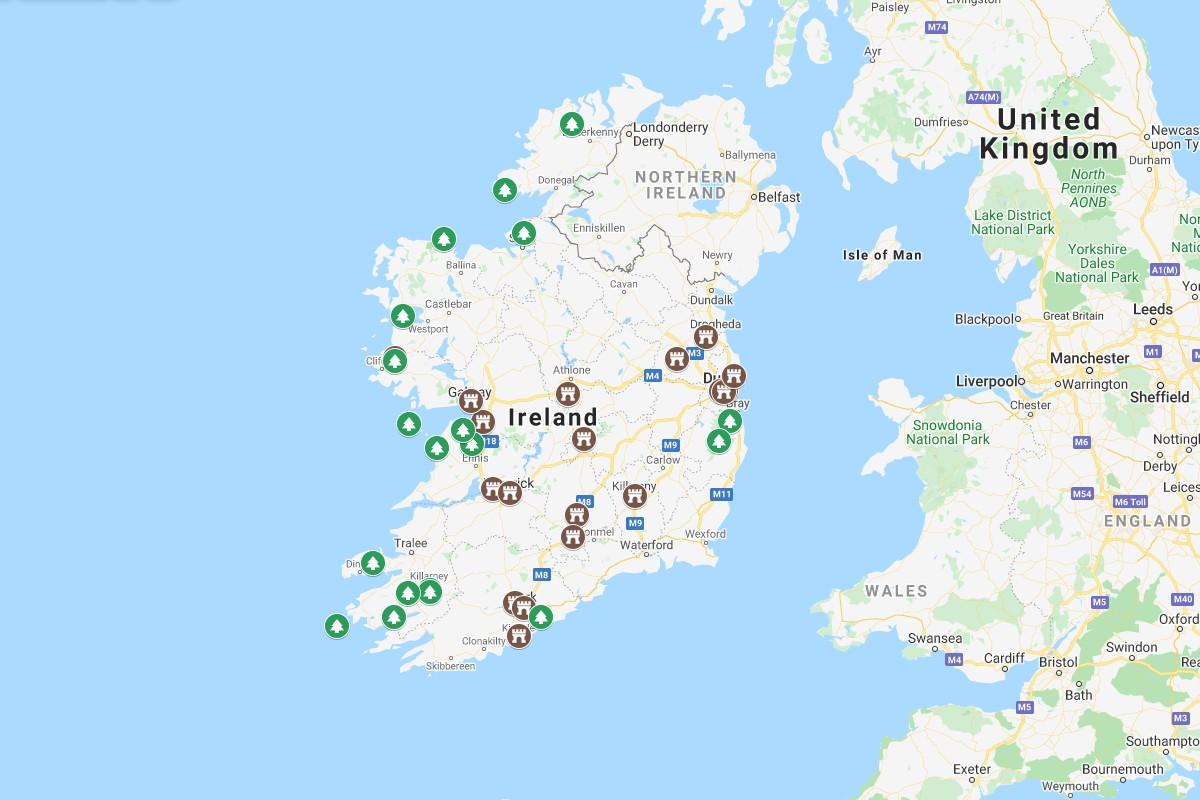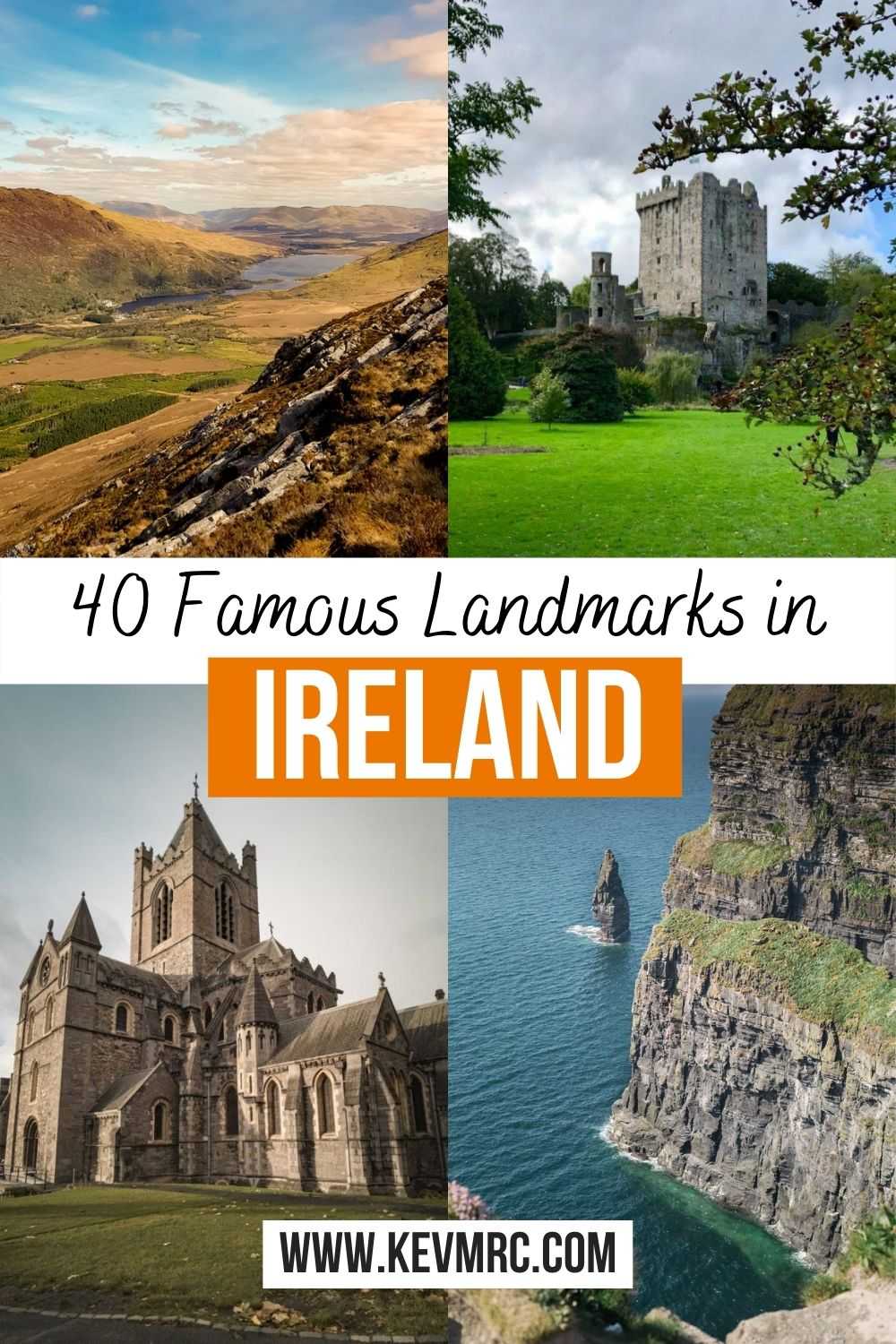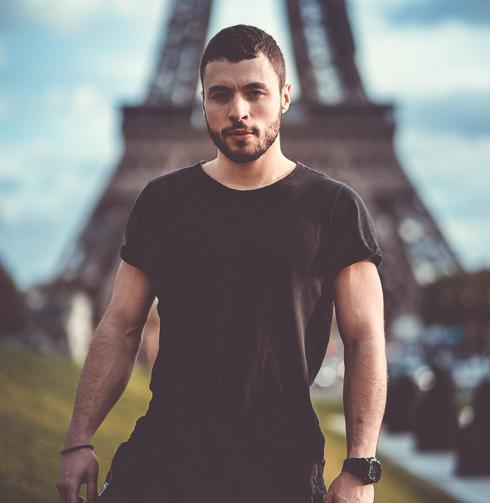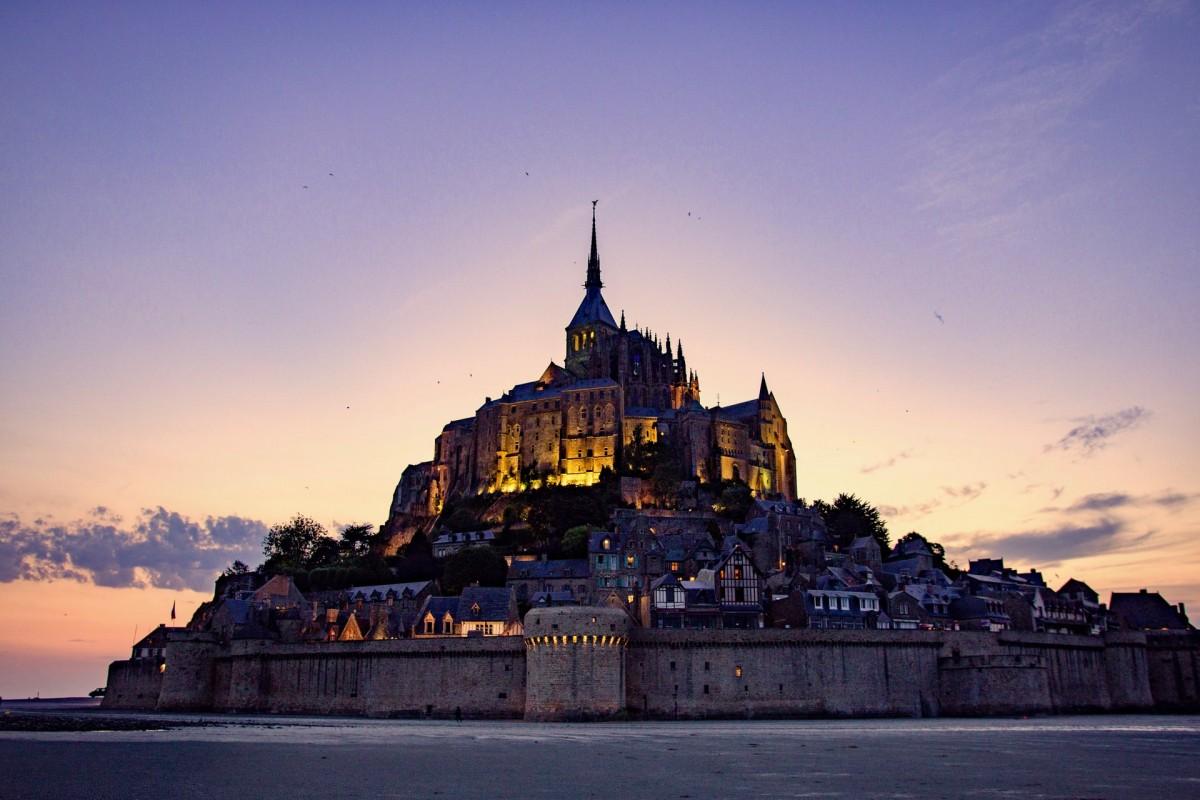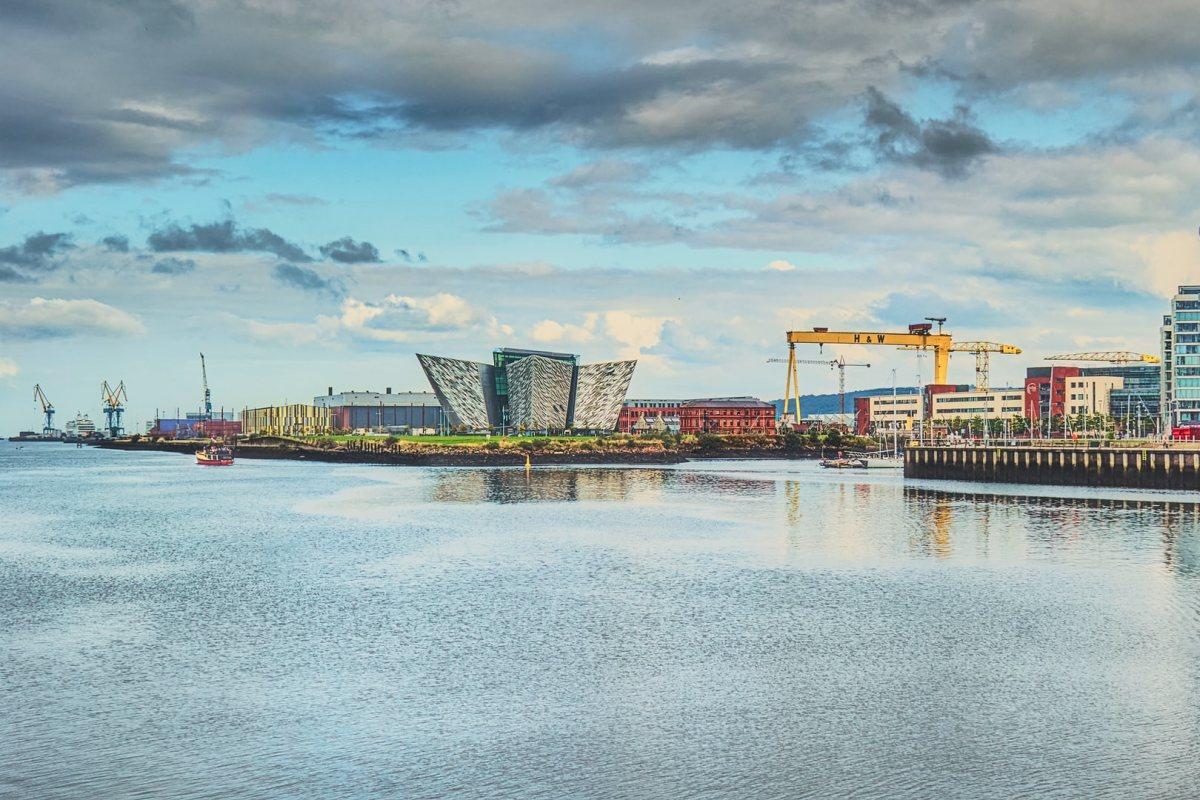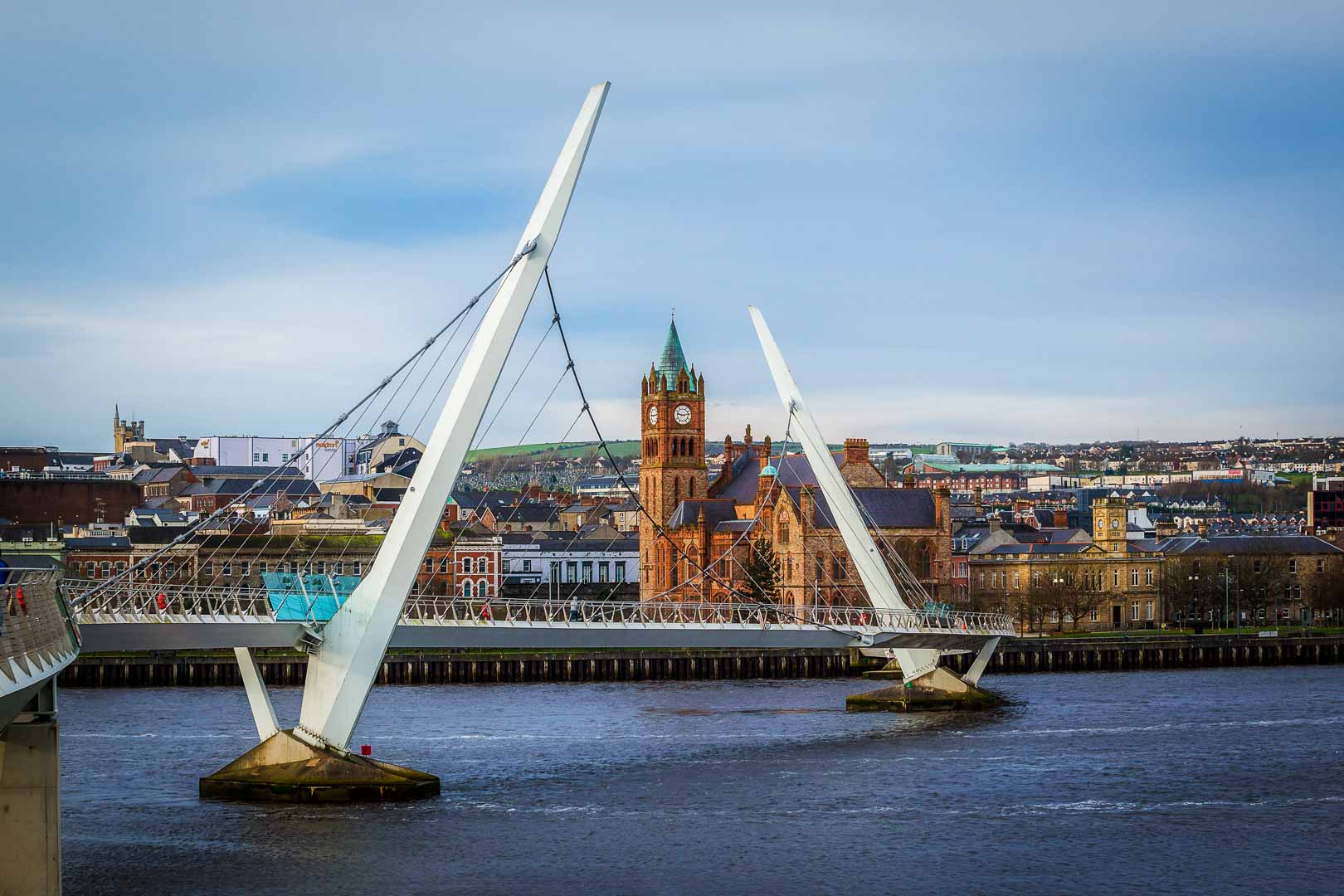40 Famous Landmarks in Ireland You Need To Visit
Away from the beaten path, Ireland is a destination somewhat underrated. Yet, Ireland is a beautiful country with plenty of wonders and beautiful cities to discover during a trip starting with its capital, Dublin.
With its breathtaking landscapes, long winding roads, dolmens, changing climate and very friendly people, Ireland is actually the perfect destination for a good old-fashioned road trip.
Wondering what are the famous landmarks in Ireland?
Here are 40 of the most famous Irish landmarks, man made and natural included! 🍀
Full List of the 40 Famous Ireland Landmarks
We can divide Ireland famous landmarks into 2 main categories: the man made and the natural landmarks. Here’s the list of the top 40, breakdown by category.
🏛 Man made and historical landmarks in Ireland:
- Rock of Cashel
- Newgrange
- Blarney Castle & Gardens
- Kylemore Abbey
- Dublin Castle
- Trinity College
- Kilmainham Gaol
- St Patrick’s Cathedral
- Malahide Castle
- Kilkenny Castle
- Bunratty Castle
- King John’s Castle
- Muckross House
- Leap Castle
- Kinsale
- The English Market
- Cahir Castle
- Trim Castle
- Clonmacnoise
- Dunguaire Castle
- Galway Cathedral
🌳 Natural landmarks of Ireland:
- Cliffs of Moher
- Connemara National Park
- Ring of Kerry
- Killarney National Park
- Torc Waterfall
- Skellig Islands
- Dingle Peninsula
- Carrauntoohil
- Powerscourt Waterfall
- Slieve League
- Burren National Park
- Aillwee Cave
- Aran Islands
- Spike Island
- Benbulbin
- Glenveagh National Park
- Glendalough
- Clew Bay
- Dun Bristé
So here’s the full list of the 40 famous landmarks Ireland has to offer. To learn more about each of these places, keep reading below! 👇
Man made Landmarks in Ireland
Ireland is full of incredible man made landmarks and monuments of all kind honoring the Irish history. Whether they played a major role in history or are purely artistic, they’re all remarkable and deserve a visit if you’re traveling the country.
Here are 21 of them!👇
1. Rock of Cashel
Located on a massive rocky peak in County Tipperary, the Rock of Cashel strikes the eye even at a great distance. This complex of medieval buildings and ruins that dominate the town of Cashel is one of the most famous landmark of Ireland. It’s also a great place to learn more about Ireland medieval period, which is why tons of tourists come here every year.
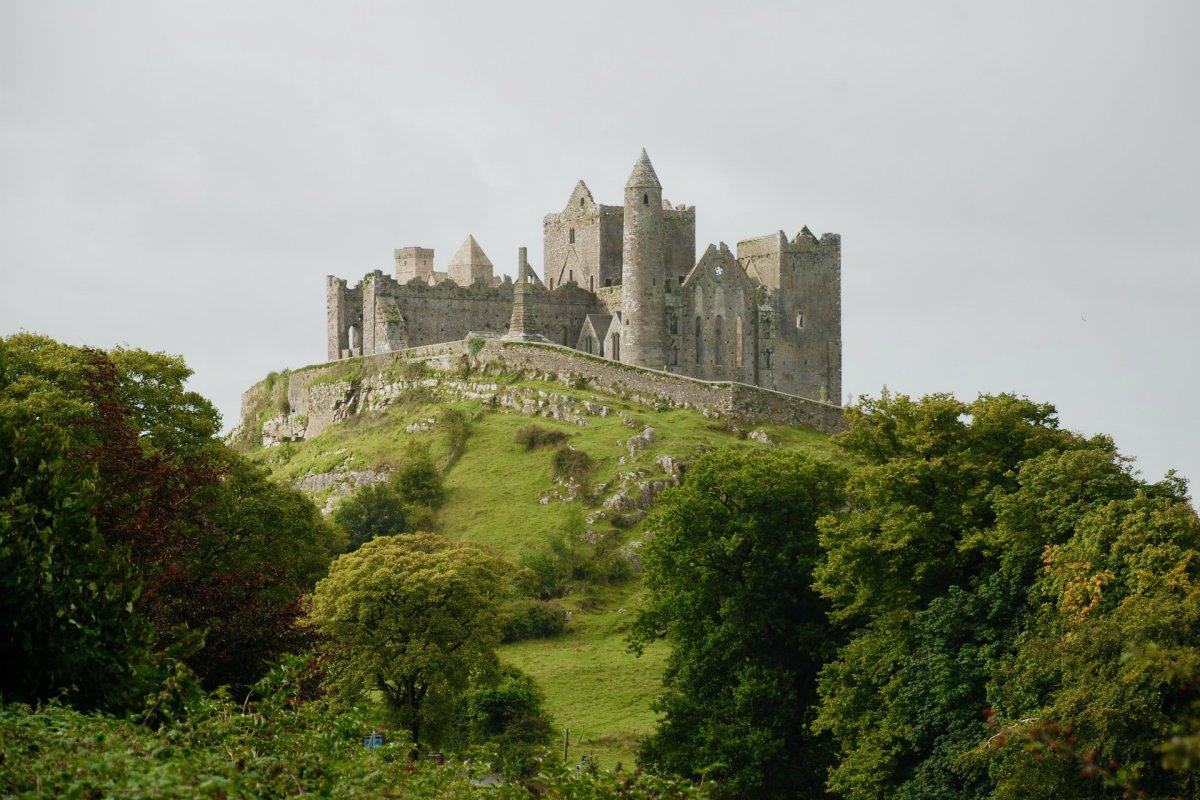
Rock of Cashel dates back to the 4th century, when a fortress, called Castle of King was built on this rocky outcrop to serve as a residence for regional kings. The location was chosen because it was perfect to watch over the surrounding plains and protect against possible attacks. Many constructions and religious buildings were added on the site until the end of the 9th century.
Visiting the Rock of Cashel is basically walking around the site and discovering the different monuments and ruins. The visit is mostly done outdoors, so make sure to check the weather before going there!
2. Newgrange
Newgrange is the most famous and also the largest of the megalithic tombs of the site of Brú na Bóinne, located about 1 hour from Dublin. The Newgrange tomb is 80 meters wide and up to 13 meters high.
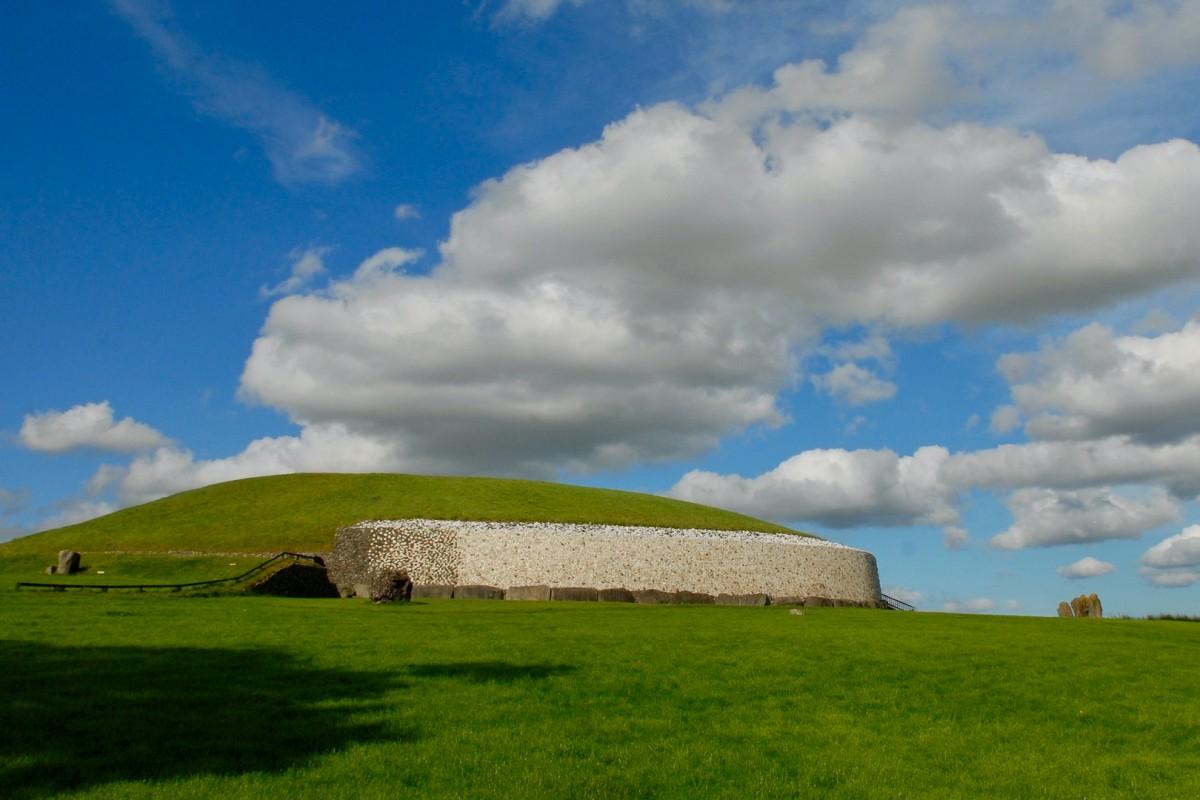
Built 5,000 years ago before the Great Pyramids of Egypt, the tomb remained closed for thousands of years, giving rise to lots of beliefs and myths. It wasn’t until the 17th century that the site was discovered and studied again. In the 1970s, it was restored to its original appearance, which explains its remarkable state of preservation today.
Visits to Newgrange are necessarily guided: you’ll particularly enjoy the large museum dedicated to the civilization that created these Neolithic tombs and the visit of the 3 corridor tombs, Newgrange, Knowth and Dowth.
3. Blarney Castle & Gardens
Located in southern Ireland only few kilometers from Cork, Blarney Castle is famous for housing the Stone of Eloquence (also known as the Blarney Stone), which is said to give the gift of eloquence when kissed.
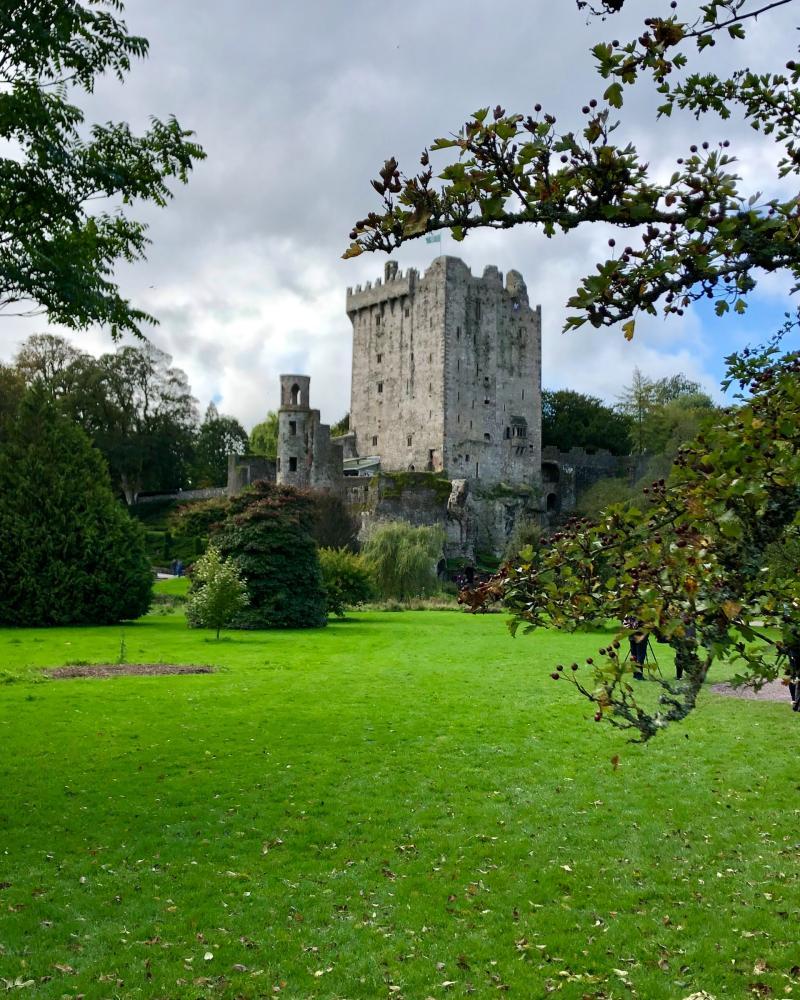
The ruins of Blarney Castle are what remains of the medieval fortress built here in 1446 on the banks of the River Martin by Dermot MacCarthy, King of Munster, on the site of an old fort dating from the 13th century.
The castle is open to visitors all year round and the estate is perfect for nature walks. There are tours to discover the surrounding gardens including Poison Garden and Rock Close. The latter is a garden laid out on an ancient druidic site where you can see a sacrificial stone, a dolmen and The Witch’s Staircase that grants wishes if you go down it backwards with your eyes closed. You’ll love learning about all these legends when visiting!
4. Kylemore Abbey
Located west of Ireland in the Connemara about 1h30 from Galway, Kylemore Abbey is a major tourist attraction not to be missed in Ireland. And for good reason, you can’t miss it when driving on the main road: a monument with white stones reflecting in a lake just in front of it in a magical mountain scenery.
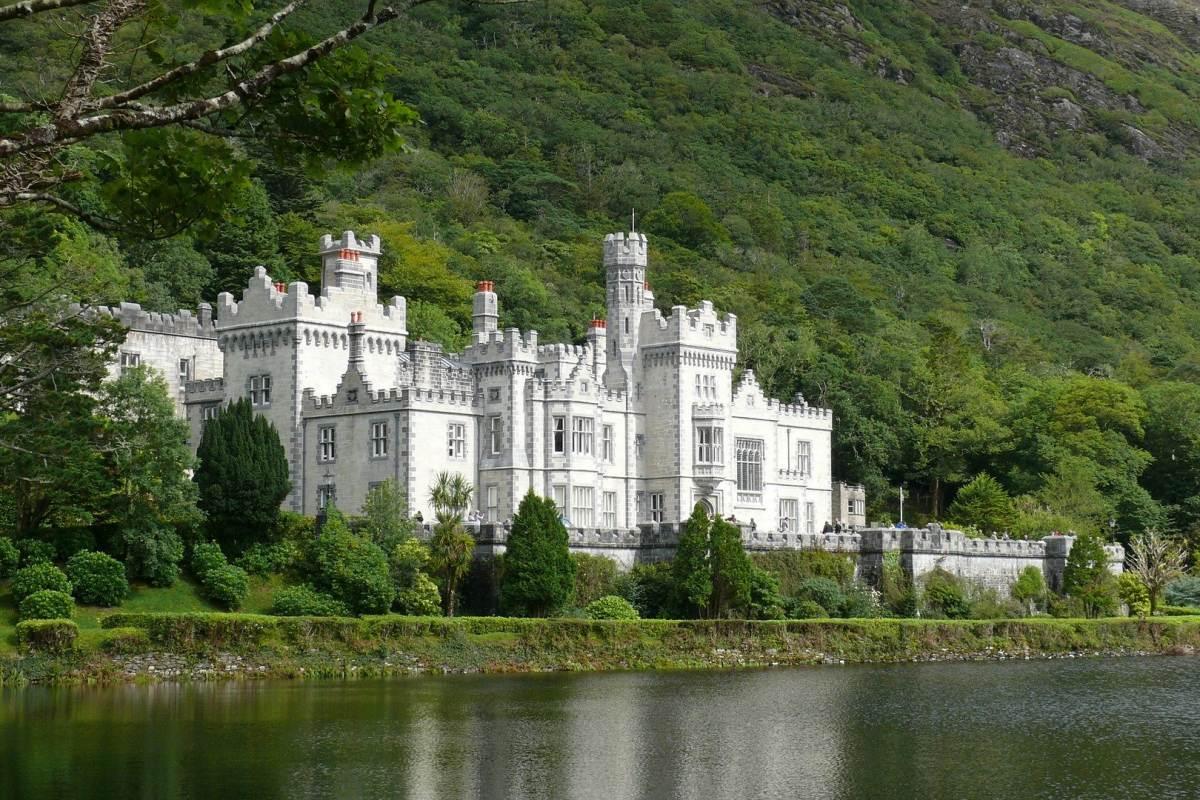
Built in 1867 by an Englishman, Mitchell Henry, for his wife who fell in love with the region, the castle became in 1920 the residence of a community of Benedictine sisters. In 1923, they created a boarding school for young girls and opened part of the abbey to the public in 1993. The boarding school was finally closed in 2010 due to a decrease in the number of students and nuns.
The small group of nuns who still lives at Kylemore today is committed to managing the estate through tourism and the production of various products for sale in the store.
5. Dublin Castle
Dublin Castle is one of the most important landmarks in Ireland from a historical point of view. Located in the heart of the city, it served as the seat of the British rulers of Ireland for nearly 8 centuries.
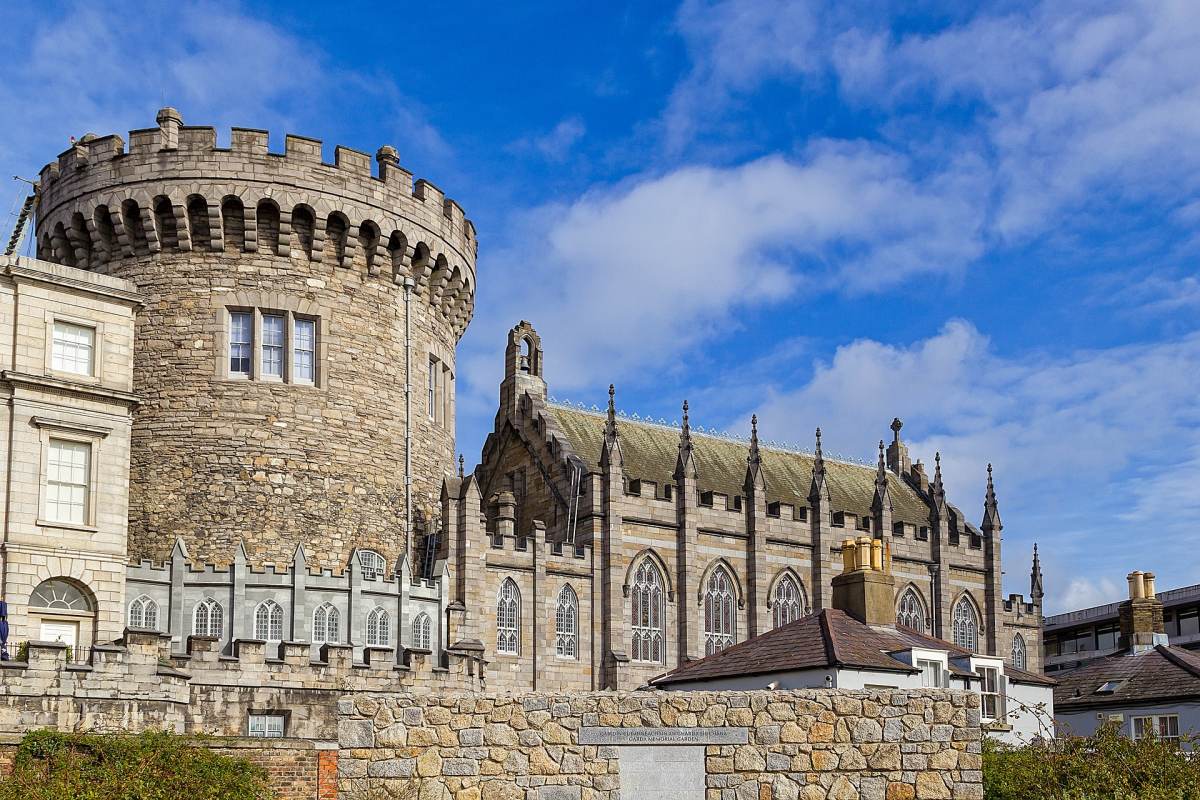
Built on the site of an ancient Viking fort, the castle was erected in 1204 by King John in order to demonstrate the supremacy of the Anglo-Saxon rule over the Irish at the time when the country was occupied by England. Originally built in a Romanesque style with loopholes, ramparts and dungeons, the castle has been modified throughout history and evolved into a neoclassical style.
Today, the castle buildings are used for official conferences as well as for the inauguration of Irish presidents and other political events. There’s also an arts center in the crypt of the castle chapel, where musicians perform regularly.
6. Trinity College
Located in the center of Dublin, Trinity College Dublin (TCD) is the oldest university in Ireland and one of the best in the world. It’s also one of the most popular landmarks in Ireland and Dublin.
Founded in 1592 by Queen Elizabeth I on the initiative of a small group of Dublin citizens, TCD is largely inspired by the English universities of Oxford and Cambridge. For a long time, it was limited to male and Protestant students only. It wasn’t until 1793 that Catholics were admitted, an authorization that was extended in 1873 to all religions. As for women, they are admitted since 1904. Nowadays, the university has nearly 17,000 students from Ireland and around the world.
Tourists of course come to discover the architecture of the campus, but in particular to discover the Old Library and the famous Book of Kells, a great illuminated manuscript created by monks in the 9th century.
7. Kilmainham Gaol
Among all the famous monuments in Ireland, Kilmainham Gaol is for sure one of the most touching one. This prison has indeed counted among its prisoners many leaders of the Irish rebellion, including Theobald Wolfe Tone, Charles Stewart Parnell or James Connolly. Some of them were even executed there, especially the leaders of the Easter Rising of 1916.
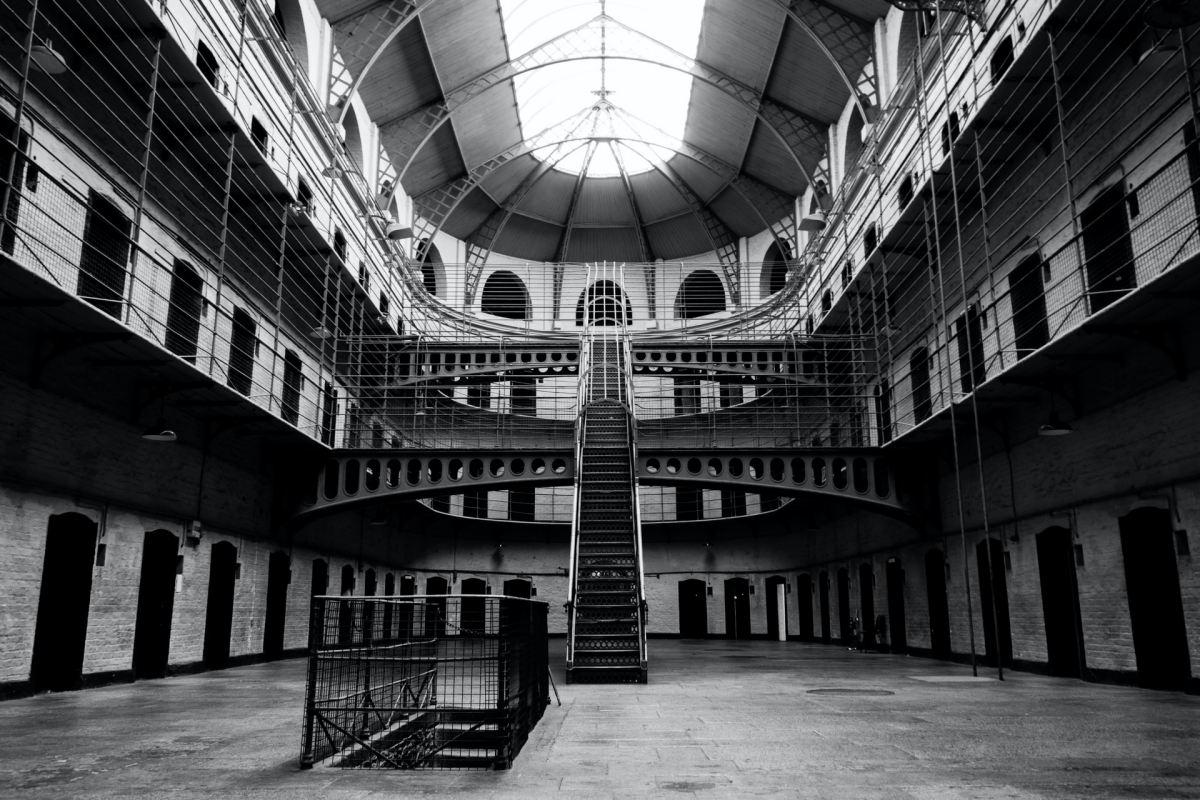
Built in 1796, Kilmainham Gaol was considered a symbol of modernity at the time. But in fact, the detention conditions were particularly harsh: unheated, unlit cells (each prisoner had one single candle per week), isolation, poor food…
After the creation of the Irish Free State in 1922, the prison that symbolized the English oppression and the sufferings of the Irish people in their fight for freedom closed its doors and was abandoned for many years. It was only in the 1960s that it was classified as a historical monument, restored and transformed into a museum.
8. St Patrick’s Cathedral
St. Patrick’s Cathedral, also known as Dublin Cathedral, is located in the heart of Dublin in the Old Town. It’s the seat of the Church of Ireland and houses many funerary monuments, a chapel dedicated to Mary as well as Jonathan Swift’s burial, the author of Gulliver’s Travels.
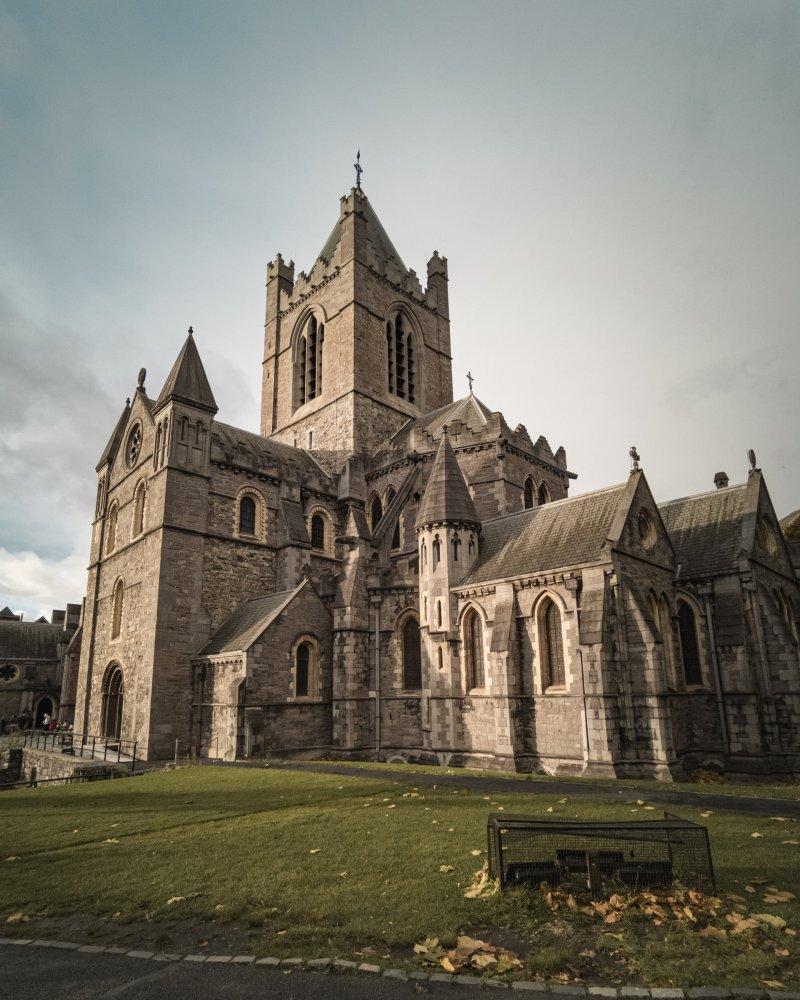
The legend tells that the cathedral was built next to the spring in which St. Patrick baptized his followers. A first wooden church was built in the 5th century. In the 12th century, a gothic stone church was built by the Normans. In the 13th century, the building was again rebuilt in the Gothic style.
The interior of the cathedral houses ornaments from different periods. Visitors can admire the floor made of decorated polychrome tiles, the beautiful stained glass windows and many monuments illustrating Ireland’s history.
9. Malahide Castle
Malahide is a small town located north of Dublin, a typical Irish village with its colorful streets, artisanal stores and small restaurants. Malahide is best known for its harbor and its castle.
Malahide Castle and its quiet gardens fit perfectly into the picturesque setting of the ancient seaside town. For nearly 800 years, the house served as a fortress for the Talbots, one of the oldest families in Ireland. Living in the castle since 1185, the last of the Talbots died in 1973.
You can visit the interior of the castle with a guided tour to learn about its history. You can also discover the gardens surrounding the castle, which is the part visitors usually prefer.
10. Kilkenny Castle
Standing in the middle of a green park near the River Nore, Kilkenny Castle is one of the oldest castles in Ireland.
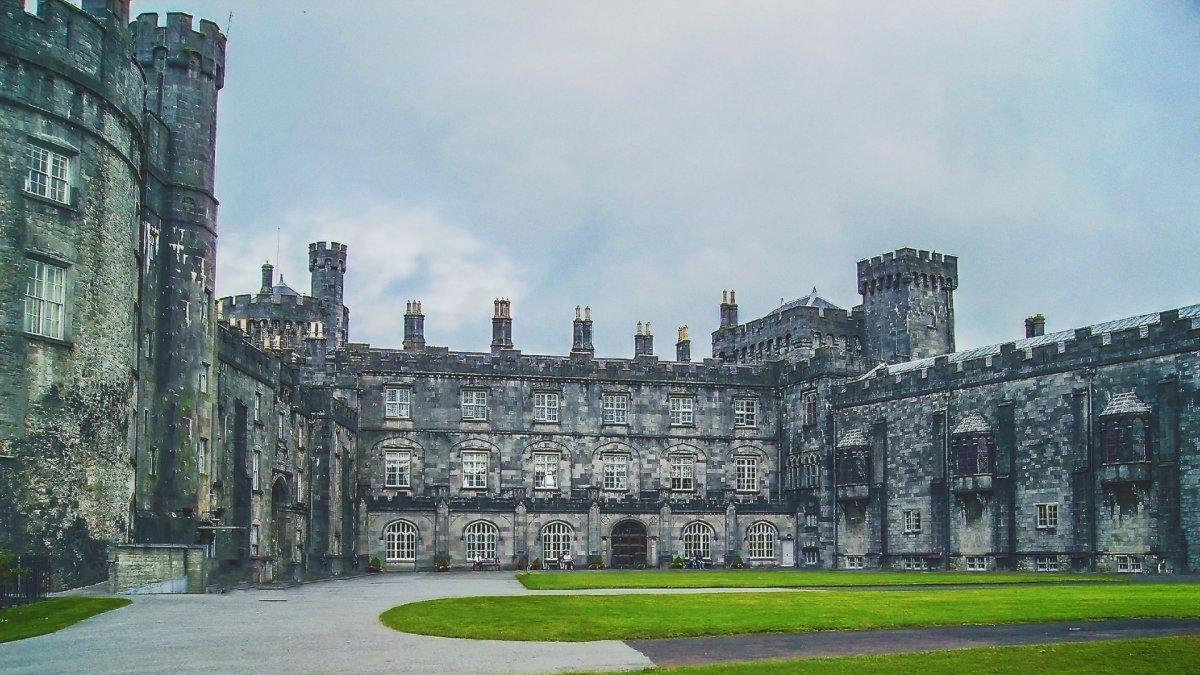
The origins of Kilkenny Castle go back more than 800 years, shortly after the Norman Conquest. Built in wood in the 12th century, the castle was rebuilt in stone in the early 13th century. Its elevated location at the crossroads of many major routes provided a defensive advantage for watching outside movements. The monument has undergone many transformations over the course of its history, from Norman to Victorian architecture.
Today, you can visit the castle with its rooms, family portraits and Victorian decor. A café takes place in the old kitchens accessible independently of the castle and without entrance fees.
11. Bunratty Castle
Located 20min drive from the town of Limerick, Bunratty Castle is a famous medieval monument that will delight any history buff. It was built by Robert Muscegros in 1270, rebuilt by Thomas De Clare a few years later and by the McNamara clan in 1425.
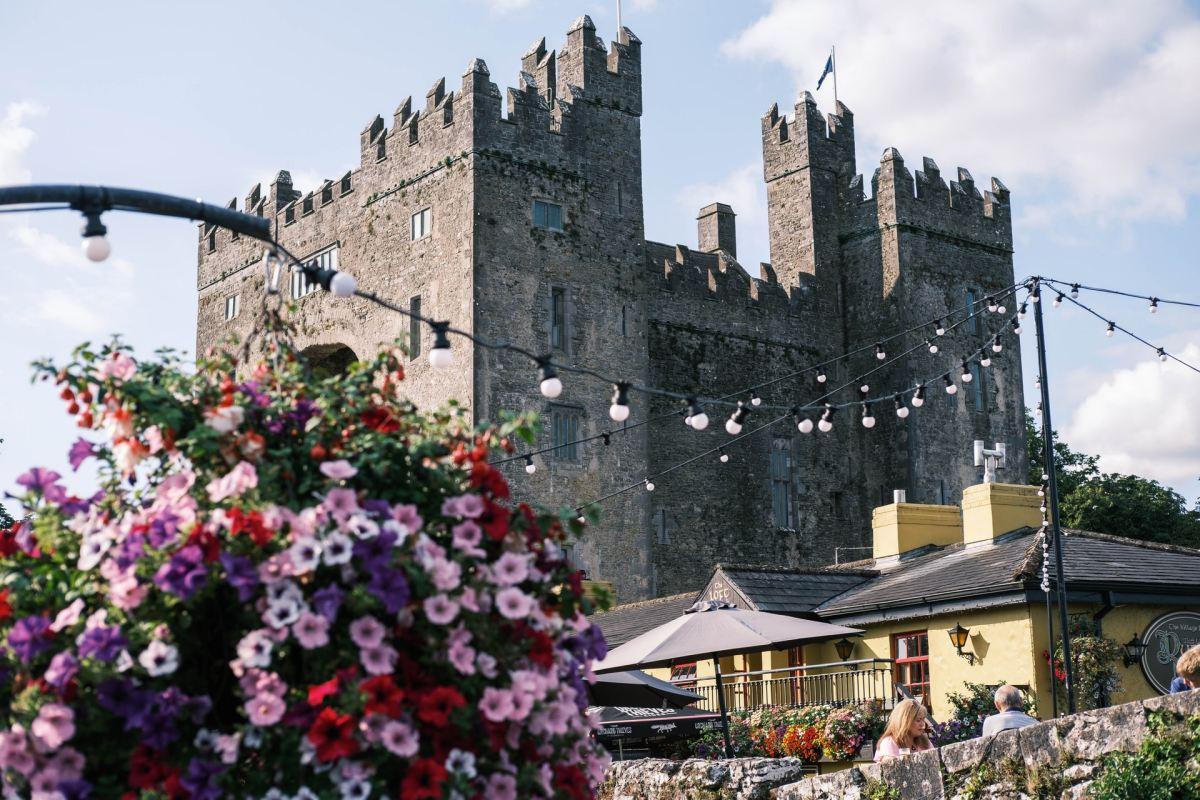
The castle has recently been restored and can be visited to admire the tapestries, furnitures and paintings. Every evening, a medieval banquet is held here: visitors dress in medieval costumes and spend the evening eating and drinking to the sound of the harp.
Around the castle, the Bunratty Folk Park recreates a traditional 19th century Irish village with its cottages, farms, church, shops, school, post office, etc… And every evening from May to October, tourists can experience medieval Ireland during the Traditional Irish Night.
12. King John’s Castle
Located in the heart of the medieval district of Limerick, King John’s Castle is the oldest castle and a top attraction of the city.
Built in the 13th century by King John of England on the banks of the River Shannon, it was initially a Viking fortress built in 922. King John’s Castle was built in order to defend the border between the Gaelic kingdoms to the west and the Norman kingdoms to the east and south.
When visiting the castle, you’ll discover a building well maintained that has preserved its medieval soul. From the top of the castle’s towers, you can see the surroundings of Limerick city, the Thomond Bridge connecting the 2 banks of the Shannon River, the Treaty Stone, as well as the Thomond Park Stadium.
13. Muckross House
Muckross House is a superb manor house located in the heart of Killarney National Park, southwestern tip of Ireland.
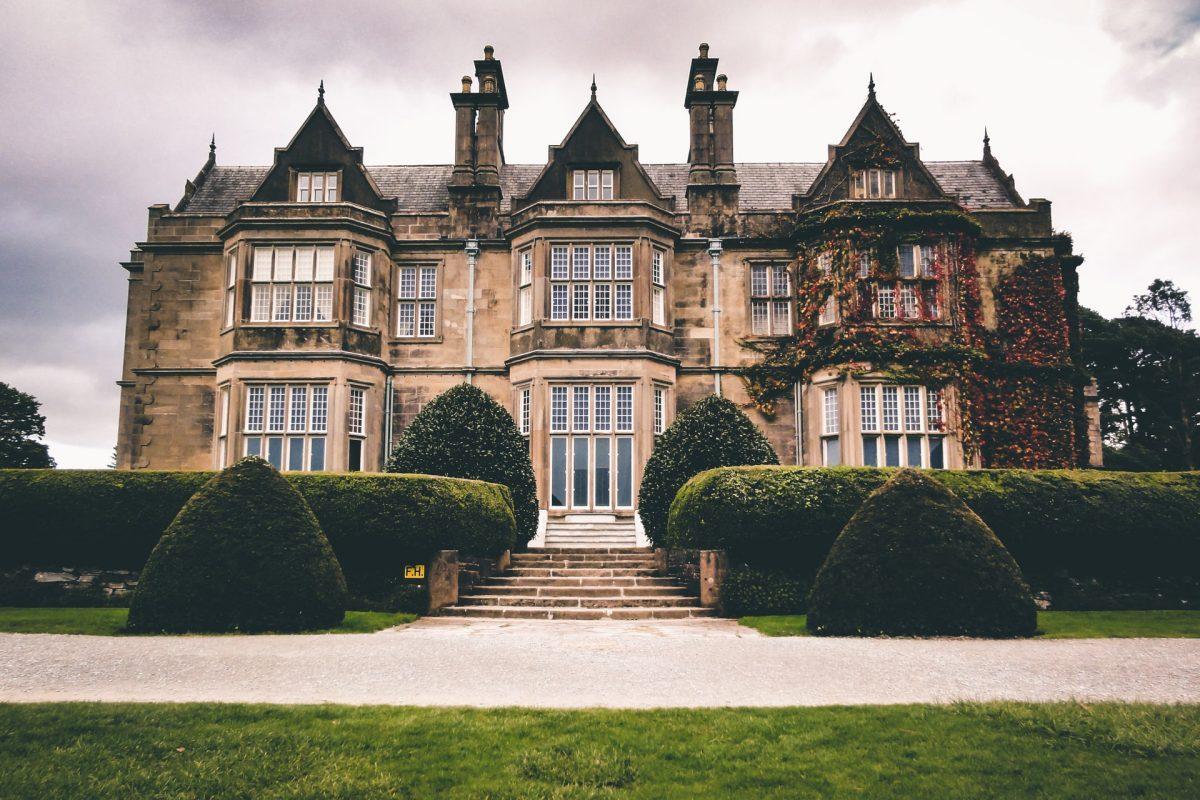
Built in 1843 in a Tudor style, Muckross House was the home of the MP for County Kerry, Henry Herbert. With no less than 60 rooms, this manor house has welcomed many personalities including Queen Victoria who came in 1861.
Today, Muckross House is home to a museum featuring various handcrafts activities. Right next to it, The Muckross Traditional Farms are reconstructions of Kerry farms from the 1930s. And around the manor house, beautiful gardens lead down to Muckross Lake offer visitors plenty of walking options.
14. Leap Castle
Located in the heart of Ireland, Leap Castle attracts every year many curious people in search of thrills. And for good reason, the castle is said to be one of the largest haunted castles in Europe!
Built in the 15th century by the O’Carrolls, Leap Castle owes its popularity to its story and the rumors surrounding it. One of these legends tells that the O’Carrolls brothers fought fiercely, until one of them murdered the other brother who was a priest, with a sword in the stomach during a service in the castle’s chapel.
Although in poor condition, the haunted fortress is now open to the public. Some visitors have reported that strange paranormal phenomena have occurred during their visits. So don’t be surprised if you see a ghost or 2 on your way!
15. Kinsale
About 30 kilometers south of Cork, Kinsale is considered as the most beautiful village in Ireland.
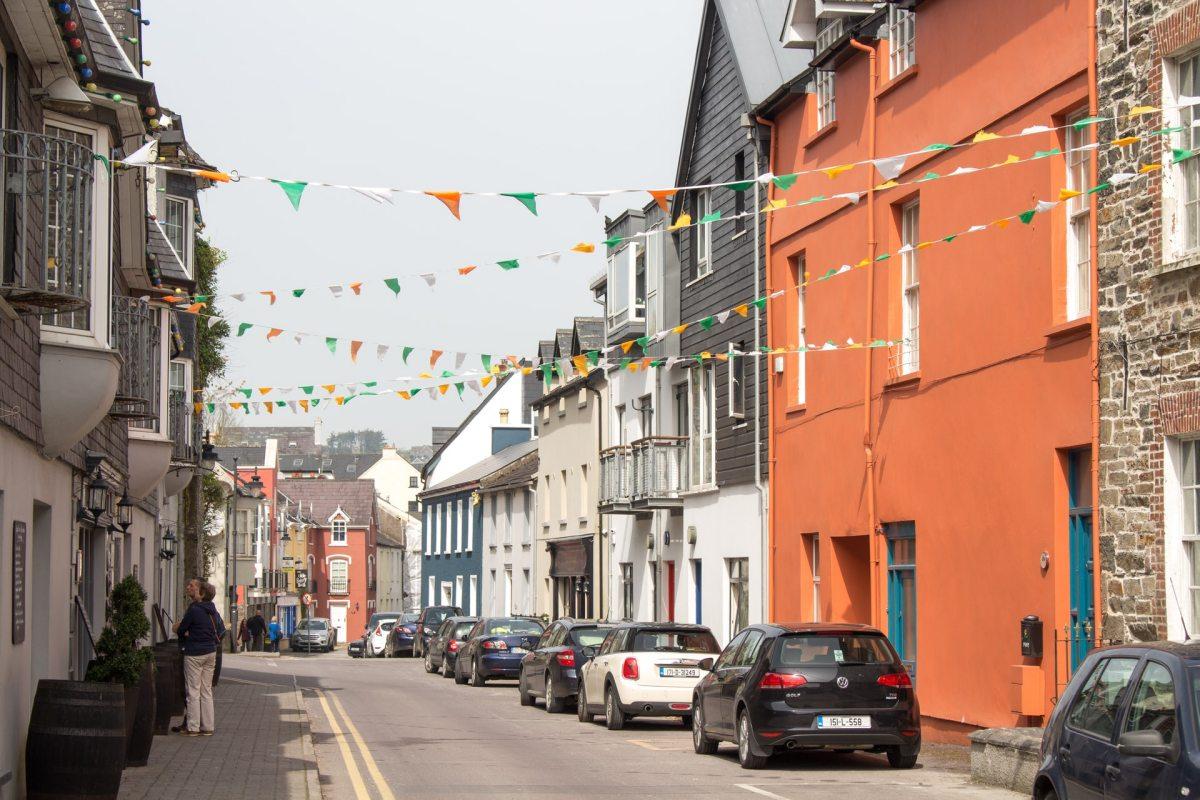
Indeed, this small harbor sheltered at the bottom of the Bandon estuary is full of charm with its small winding streets leading down to the quays and its alignments of colorful houses. Kinsale is also renowned for its gastronomy and features some of the most famous seafood restaurants of Ireland.
Kinsale attracts lots of tourists, especially in summer and on weekends. But the village is still a must-see when visiting the south coast of County Cork. You’ll absolutely love strolling through the streets of Kinsale!
16. The English Market
Open since 1788, Cork City’s English Market is one of the oldest covered markets in Europe!
Located in the heart of Cork, this market has endured through history and has survived flames, civil war and attempts to change its name.
This English Market is a place to be for any foodie. There are so many tasty foods that you’ll find it hard to restrain yourself. The market focuses on local and traditional products such as drisheen, pig’s trotters, Irish Spiced Beef, farmhouse cheeses, smoked salmon, wine… It’s the perfect place to try fine local food!
17. Cahir Castle
Located south of Ireland in the town of Cahir, Cahir Castle is one of the oldest medieval monuments in the country. The castle is also known for having hosted the shooting of Excalibur in the 1970s.
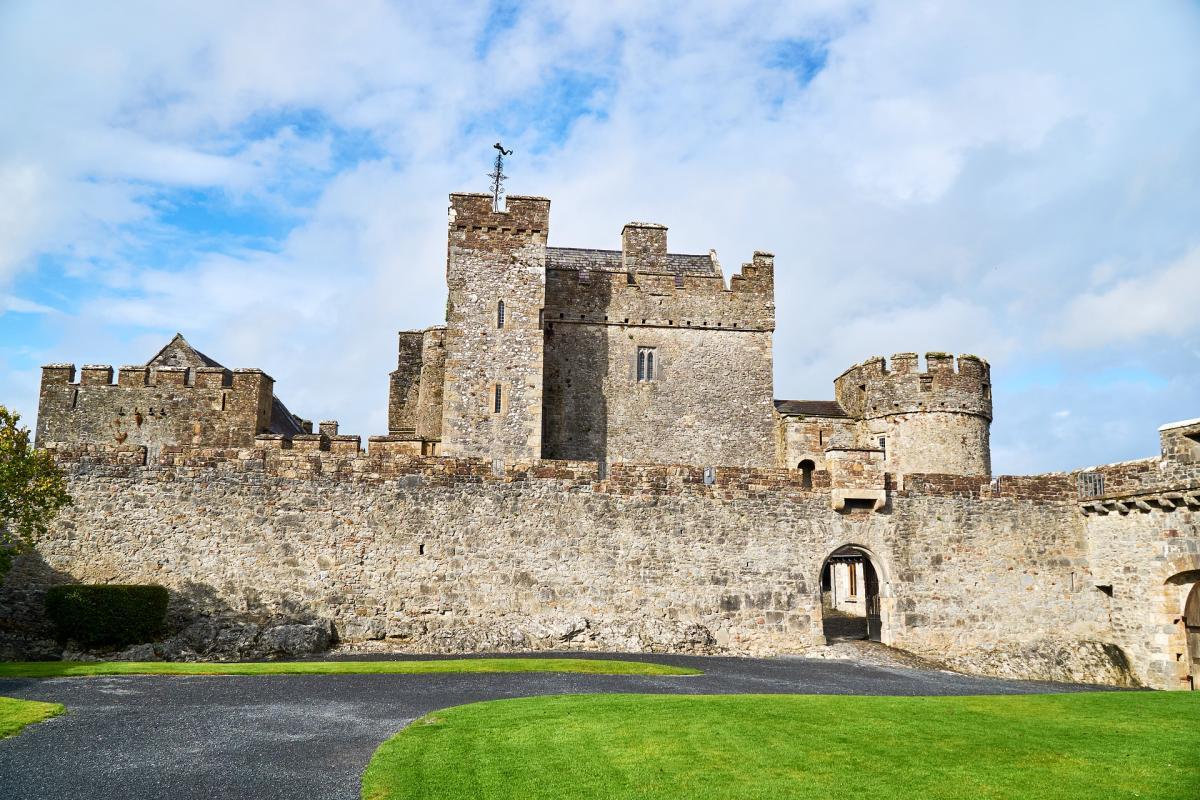
Standing on a rocky headland on the River Suir, Cahir Castle was built by Conor O’Brien in 1142. When it was founded, the castle had the best defensive structures of the time and it was widely believed to be impossible to conquer.
It finally surrendered to the heavy artillery used by the Earl of Essex in 1599. During the Irish Confederate Wars in the 17th century, the site suffered 2 sieges and a cannonball remained stuck in the facade of the northeast tower to this day.
18. Trim Castle
Trim Castle, located in County Meath 1 hour from Dublin, is the largest castle in Ireland and the most important Norman architectural complex in Europe.
Henry II of England charged Hugh de Lacy, Lord of Meath, to supervise the smooth running of the area. Hugh de Lacy therefore built Trim Castle between 1172 and 1206 to serve as the center for the Norman administration for Meath County. After the Cromwellian conquest of Ireland, the castle passed to the Wellington family, and then to several other families until 1993.
Covering 30,000 square meters on slightly elevated ground, the castle impresses with its size and its breathtaking view of the River Boyne. The castle is also known for being one of the filming locations for Braveheart.
19. Clonmacnoise
Ireland is home to countless monastic sites representing a medieval era when Irish monasteries were a reference on the European continent. The monastery of Clonmacnoise is one of the most fascinating of them.
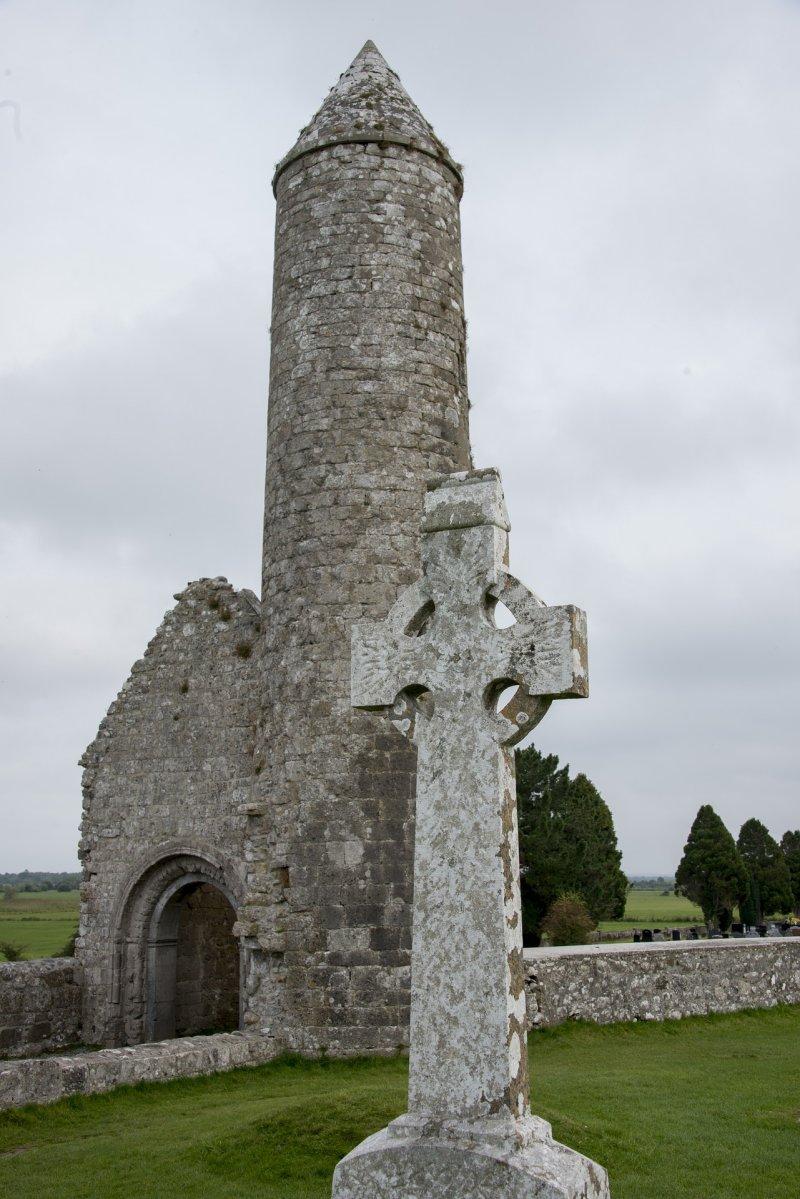
Located in County Offaly on the banks of the Shannon, Ireland’s main river, the monastery was founded in 545 by Saint Ciaran. Quickly the monastery became famous in Ireland in the fields of religion, literature and arts, attracting even many laymen. Between the 7th and 12th centuries, monks came from all over Europe to study and pray at Clonmacnoise, a symbol of “The Land of Saints and Scholars” that Ireland was then.
Much of the ruins now visible date from the 10th to 12th centuries. The 3 high crosses of Clonmacnoise impress all visitors, although they are replicas (the original sculptures are carefully preserved in the site’s center).
20. Dunguaire Castle
Standing on the shore of Galway Bay, on the site of a former royal palace, this 16th-century fortified tower is one of the most photographed in Ireland, for good reason.
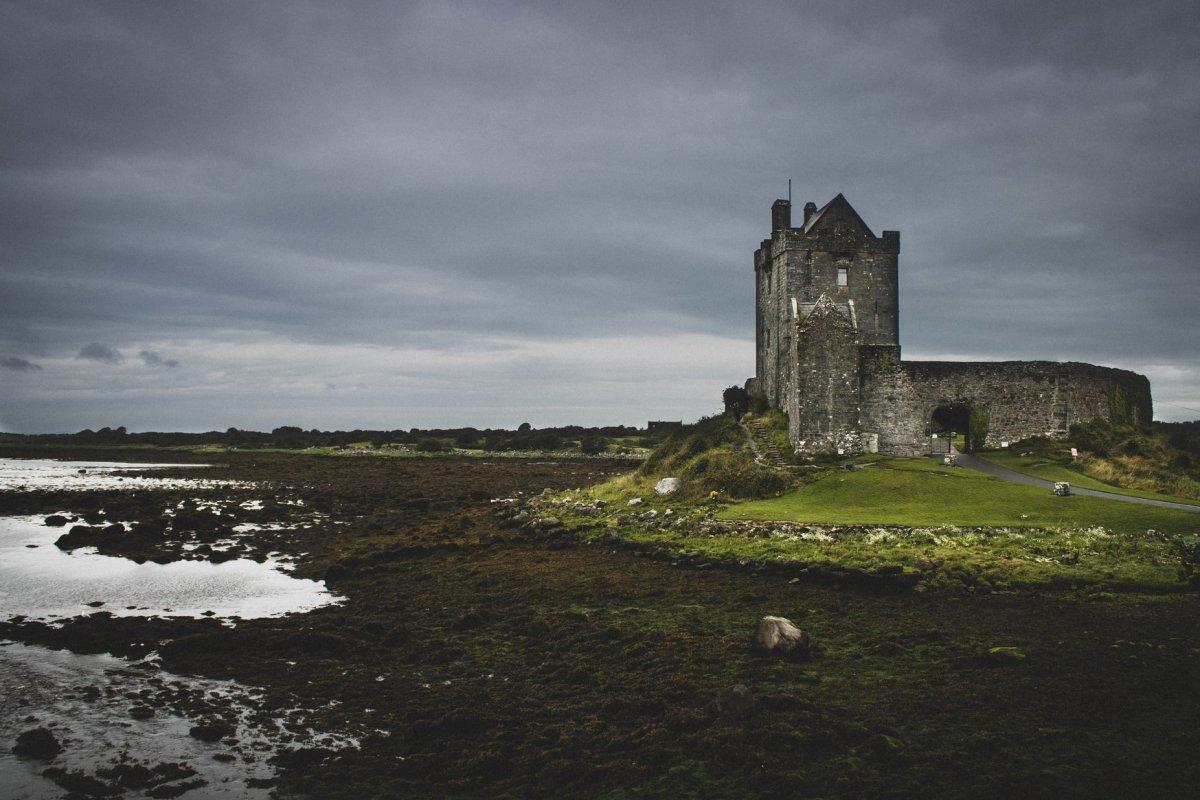
Located in the east of the country on the Atlantic coast, the castle offers one of the most beautiful views of Galway Bay.
Very well restored and richly decorated inside, Dunguaire Castle is open to visitors only in summer. During this season, it hosts medieval banquets on evenings and visitors are entertained by actors in period costumes and traditional Irish music groups.
21. Galway Cathedral
The Cathedral of Our Lady Assumed into Heaven and St Nichola, also known as Galway Cathedral, is located in the heart of the Irish city of Galway along the River Corrib.
Built between 1958 and 1965, on the site of a former prison, Galway Cathedral is one of the newest stone cathedrals in Europe. Massive with its 44-meter copper dome, the cathedral is a spectacular monument and an iconic landmark of Galway.
Its exterior may seem stark, but once you step through the portal, you can’t help but change your mind. Indeed, the interior of the cathedral, in a mixture of Neo-Renaissance and Hiberno-Saxon style, is quite remarkable by its large spaces, its huge stained glass windows and its magnificent carved wooden roof. Large frescoes and mosaics also enhance the cathedral.
So, this is it for the famous man made landmarks in Ireland! 🎉
Keep reading below to discover more major landmarks in Ireland, natural ones this time!
Natural Irish Landmarks
Ireland is extremely rich in natural places unique in the world, completely wild places between land and sea. If you like wide open spaces, then you’ll definitely find your happiness in Ireland.
Here are 19 natural sites ranking in the top Irish famous landmarks right below!👇
22. Cliffs of Moher
Located south of Galway on the west coast, the mythical Cliffs of Moher are the most visited natural site in Ireland. More than one million tourists come to visit them every year!
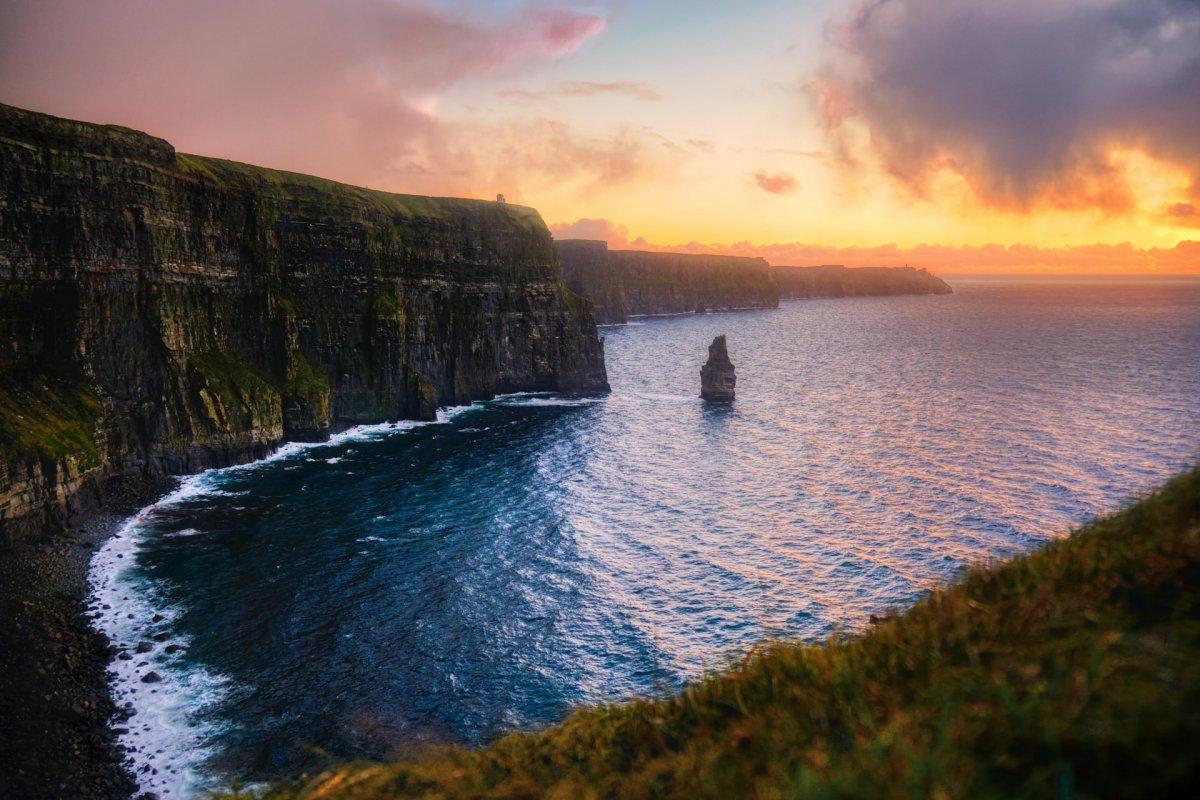
These jaw dropping cliffs protected by UNESCO are more than 8 kilometers long and reach up to 215 meters high above the North Atlantic Ocean. They offer a beautiful landscape, ideal for hiking until reaching the best viewpoint at Hag’s Head.
Formed about 320 million years ago, the Cliffs of Moher are a limestone and shale massif eroded by wind, rain and ocean cutting them with the waves. The cliffs are also home to a very rich fauna including seabirds. It’s also a great spot for seals and dolphins observation.
23. Connemara National Park
Located about 1h30 northwest from Galway, the Connemara National Park is an absolute must for any trip to Ireland. Very popular among tourists, this true paradise on earth covers more than 2,000 hectares and houses an extremely diverse fauna and flora.
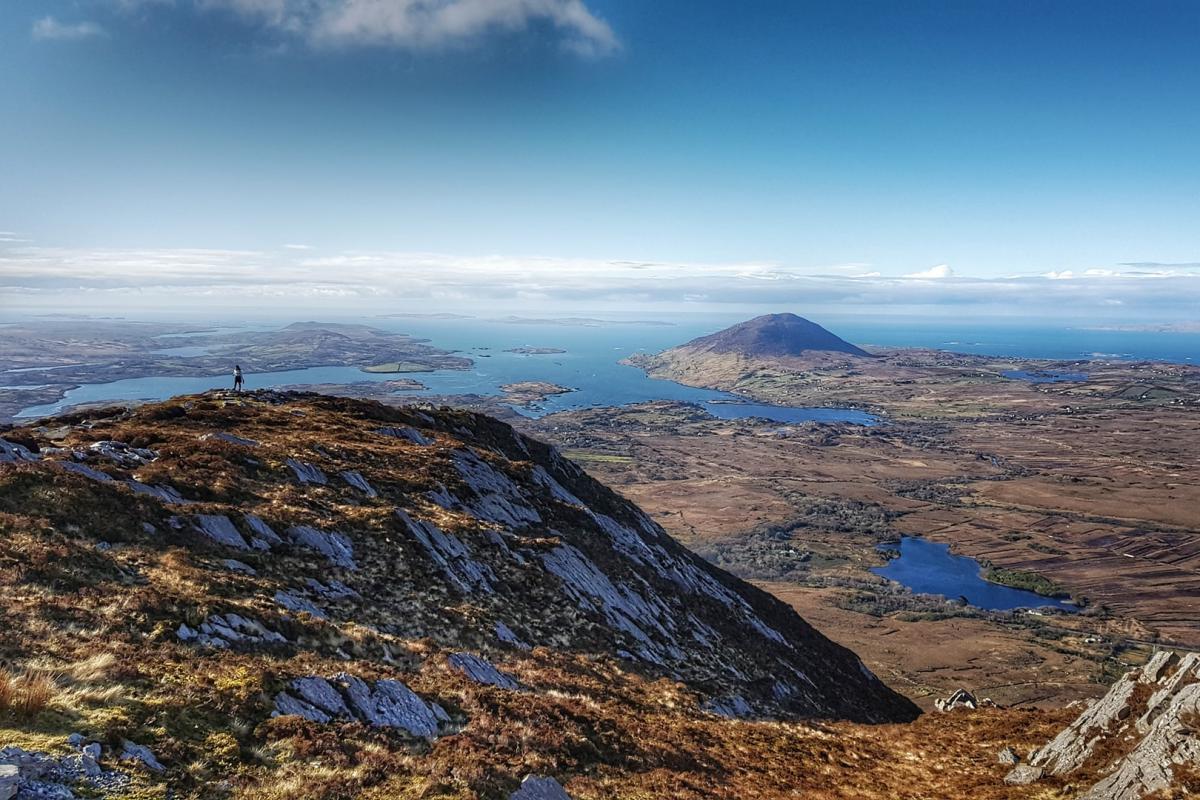
There, more than 3/4 of the land is unusable and uncultivable, which makes it a very preserved region, still very wild. Visitors can discover the park’s beautiful wildlife through 3 different trails of various lengths and difficulty. From the imposing mountains, especially from Diamond Hill, the panorama of the rolling plains, forests, lakes and bogs will leave you breathless.
Some of the highlights not to miss in the Connemara are the famous Kylemore Abbey, Aasleagh Falls and the Glengowla Mines.
24. Ring of Kerry
The Ring of Kerry is the name of the road that goes around the Iveragh Peninsula. This 179-kilometer long route that loops from the southeast to the northeast of County Kerry and crosses the Killarney National Park is one of the most famous Ireland itinerary.
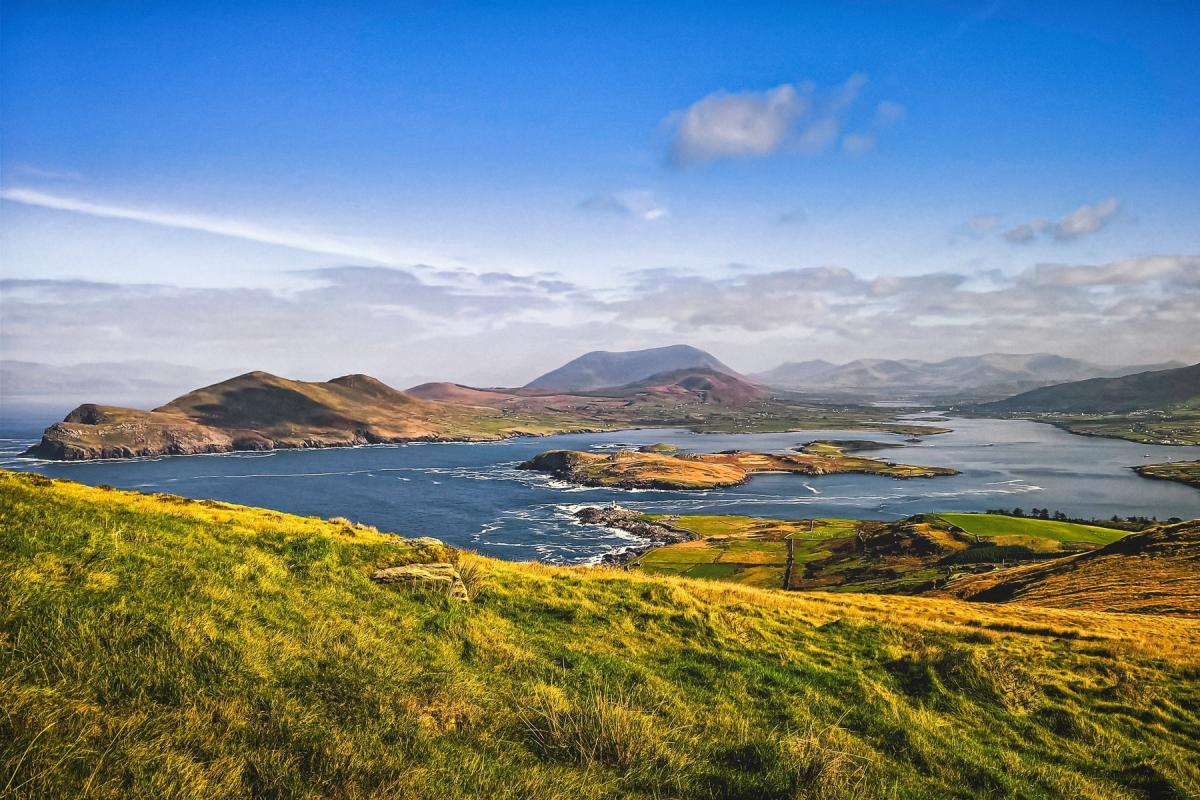
The best way to see the Ring of Kerry is to drive clockwise: this way, you’ll be on the left side of the road and you’ll have the best views over the coast. Plus, it’s easier to stop quickly to take some photos.
Besides the Killarney National Park, there are many other beautiful places along the road, including villages, beaches and mountains. Among the spots not to be missed: Moll’s Gap, Lough Barfinnihy, the Black Valley, the typical village of Sneem, or Derrynane beach for example.
25. Killarney National Park
Located in the southwest of Ireland in County Kerry, Killarney is the largest national park in the country. Classified by UNESCO as a biosphere reserve since 1982, Killarney National Park is home to more than 10,000 hectares of mountains, forests and lakes for tourists to enjoy.
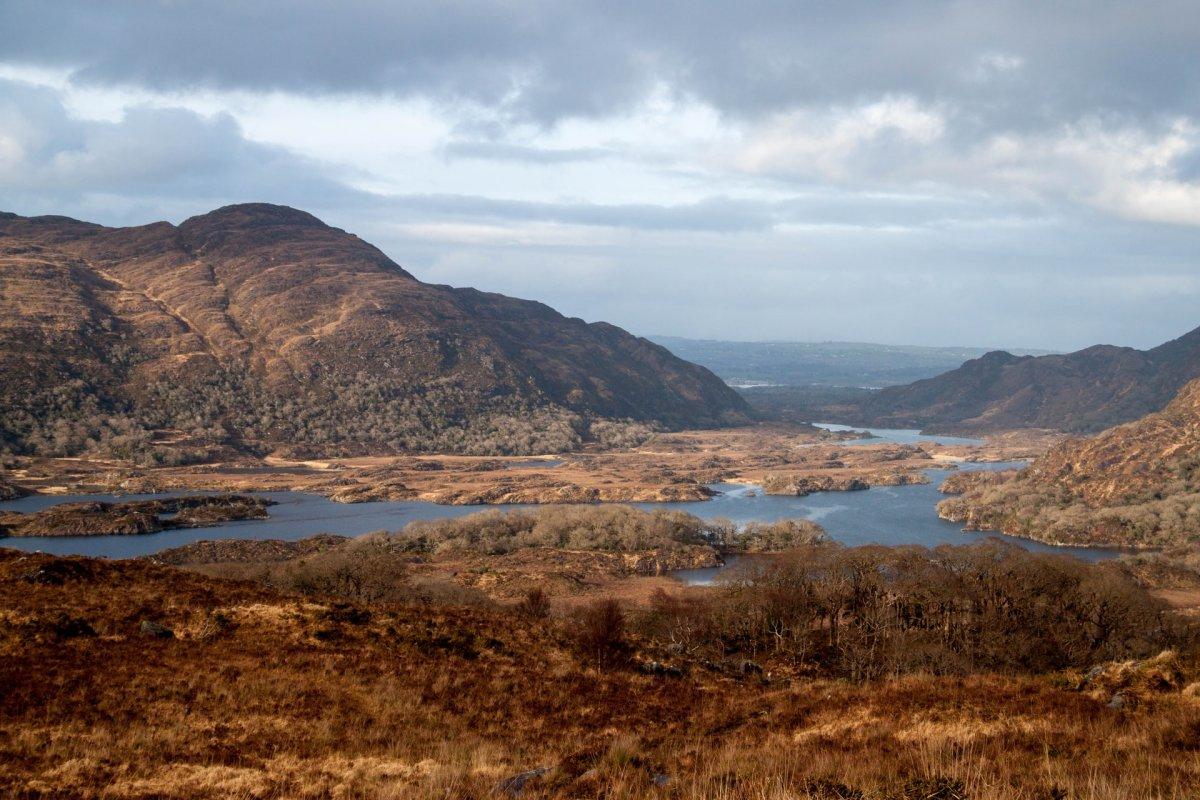
The park houses Ireland’s highest peaks, including Purple Mountain, Shehy Mountain, Mangerton Mountain and Torc Mountain. It also has 3 major lakes: Lough Leane, Muckross Lake and Upperlake.
The whole national park is a must-see, but it’s so huge you could spend months to discover it all. So, if there’s one place you shouldn’t miss in Killarney, it’s definitely the Gap of Dunloe. It’s a magical valley nestled between 2 mountains you can explore on foot or by horse-drawn carriage.
26. Torc Waterfall
Torc Waterfall is located at the foot of Torc Mountain, one of the highest mountains of Killarney National Park. Nestled in the heart of the wild forest, it’s one of the best points of interest of the park.
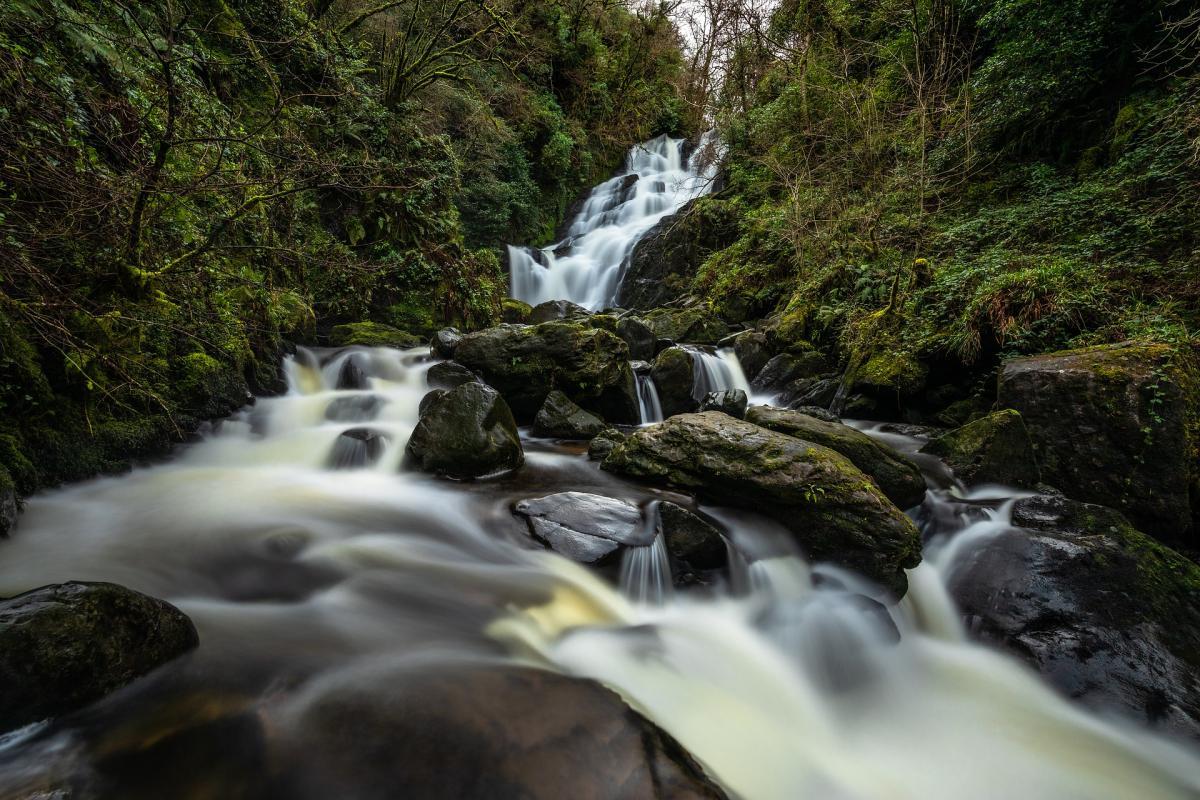
The 18-meters high waterfall and its crystal clear waters are a very popular sight for tourists, especially those visiting the Ring of Kerry. Accessible by both cars and hikers, it’s quite easy to visit it.
The power of the water varies according to the weather, so it’s recommended to visit after a heavy rain to see the waterfall at its best. For those who want to hike around, there’s a trail leading to the top of the waterfall where you’ll find a beautiful point of view.
27. Skellig Islands
The Skellig Islands are a small archipelago located about 15 kilometers off the Iveragh Peninsula in County Kerry. These islands rise steeply like pyramids, 218 meters above the Atlantic Ocean.
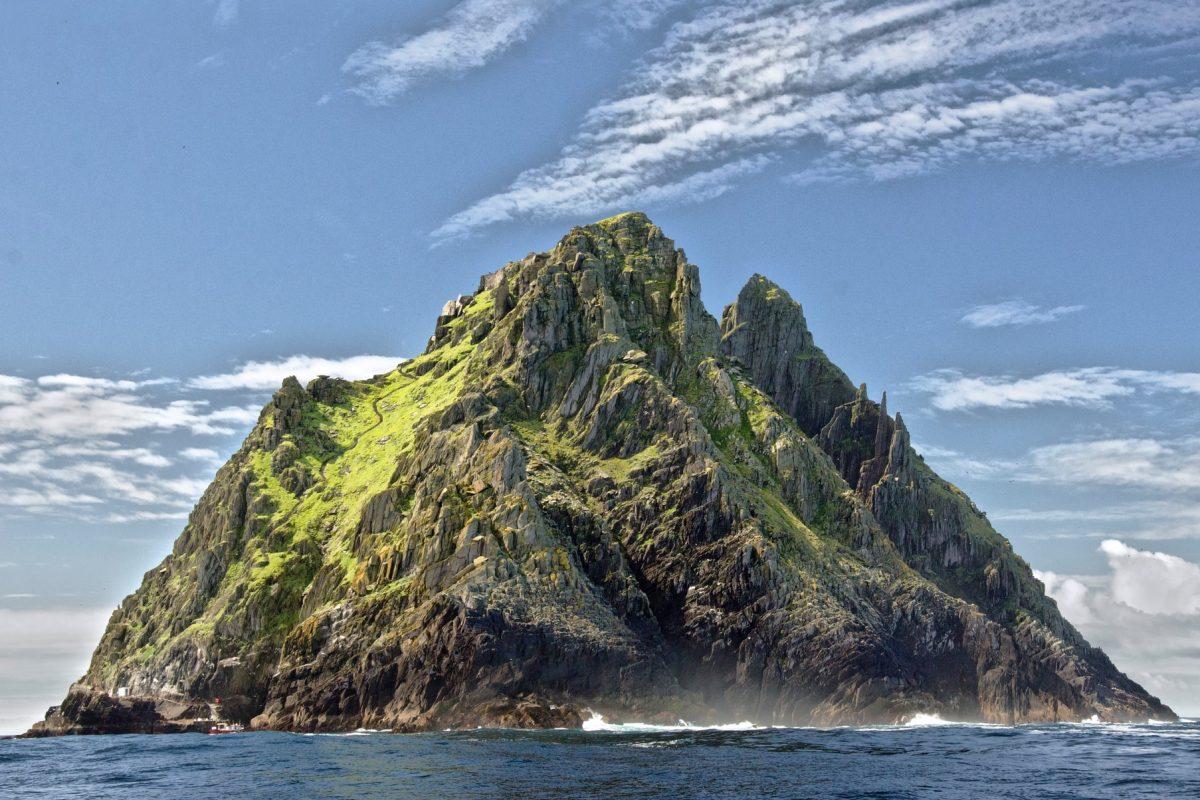
The archipelago is composed of 2 islands: Little Skellig and Great Skellig, more often called Skellig Michael. Skellig Michael is home to the ruins of an exceptional monastic complex built in the 6th century and listed as a UNESCO World Heritage Site since 1996. It has recently become famous thanks to the episodes VII and VIII of Star Wars since it was used as a filming location for the 2 films of the saga!
Of the 2 Skellig islands, only Skellig Michael is accessible to visitors, as Little Skellig is an ornithological reserve with very restricted access.
28. Dingle Peninsula
Also located in County Kerry southwest of the country, the Dingle Peninsula is one of the most popular places in Ireland. To discover it, there’s no better way than driving the dozens of kilometers of the Slea Head Drive, a spectacular road that winds along the coast starting at the town of Dingle.
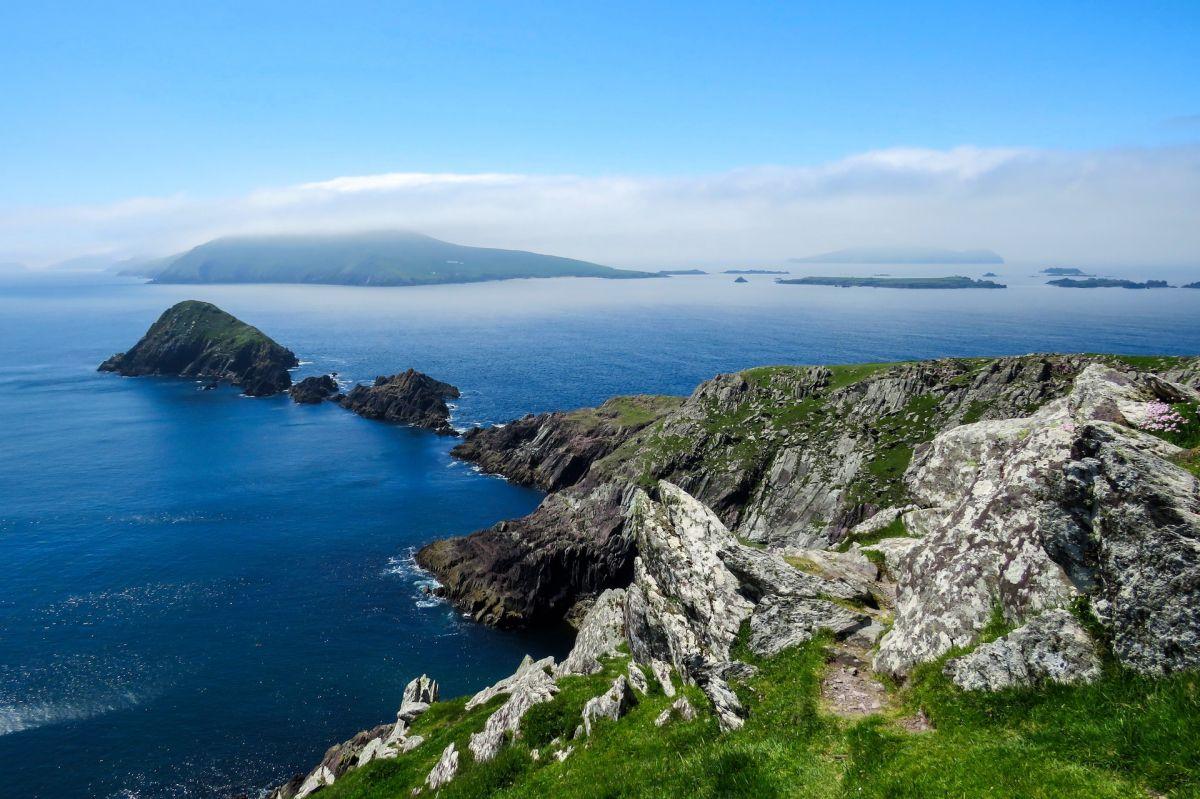
The Dingle peninsula stretches over 160 km long and is made up of stunning bays, plains, wild beaches and dramatic cliffs. Inland, visitors can discover the nature and mountains alongside picturesque villages like Cloghane or Brandon.
It’s on this peninsula that visitors can admire panoramas totally worthy of postcards such as Inch Beach, one of the most beautiful sandy beaches of Ireland, or Dunquin Harbour, a starting point to access the beautiful Blasket Islands.
29. Carrauntoohil
Carrauntoohil located in County Kerry is the summit of the Macgillycuddy Reeks and the highest mountain in Ireland (1,038 meters above sea level). If you’re interested in hiking, then Carrauntoohil must be on top of your bucket list!
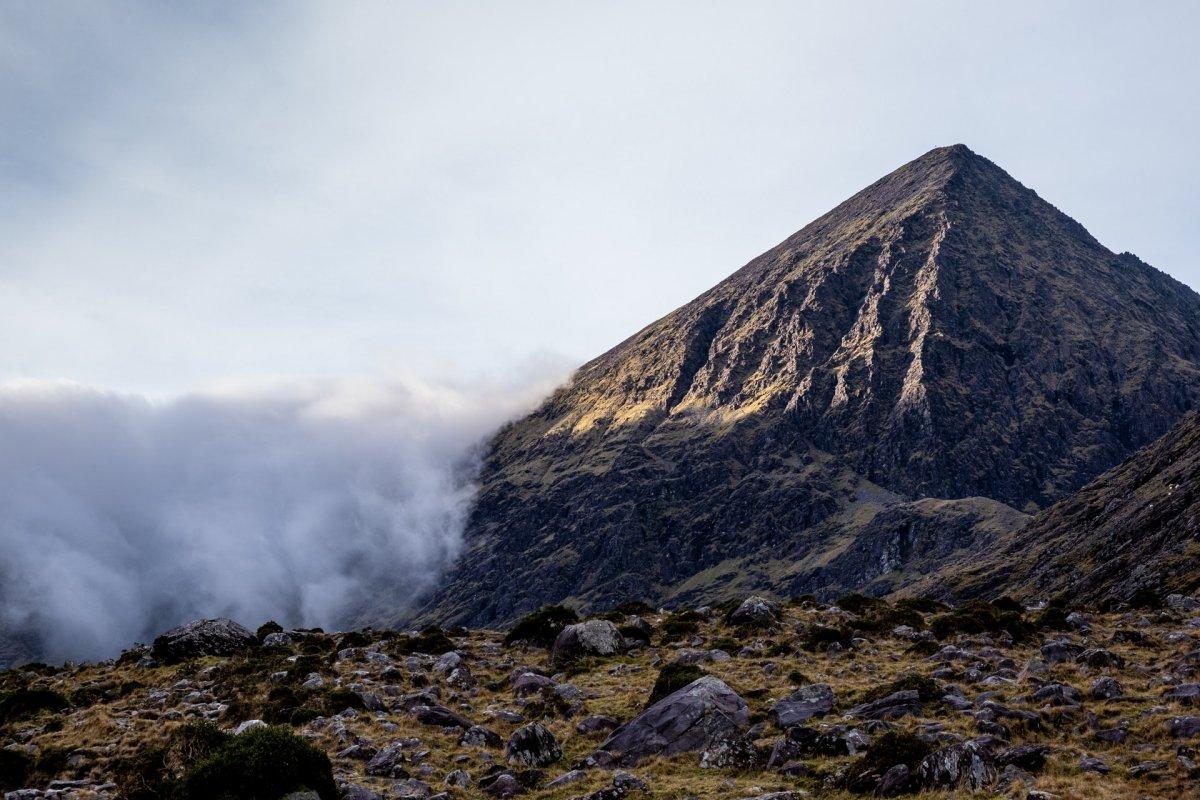
Indeed, the ascent of Carrauntoohil offers a great hiking experience in Ireland. Its summit is surrounded by deep cirques with steep slopes and narrow ridges.
At the top of Carrauntoohil stands a giant cross with a square stone shelter where you can stay to protect yourself from the wind during your break. On a clear day, you can see the Atlantic Ocean and the other mountains of the Macgillycuddy’s reeks.
30. Powerscourt Waterfall
It’s in County Wicklow in the east of Ireland that you can discover the highest waterfall in Ireland, the Powerscourt Waterfall. The Powerscourt Waterfall is 121 meters high at the foot of the Wicklow Mountains.
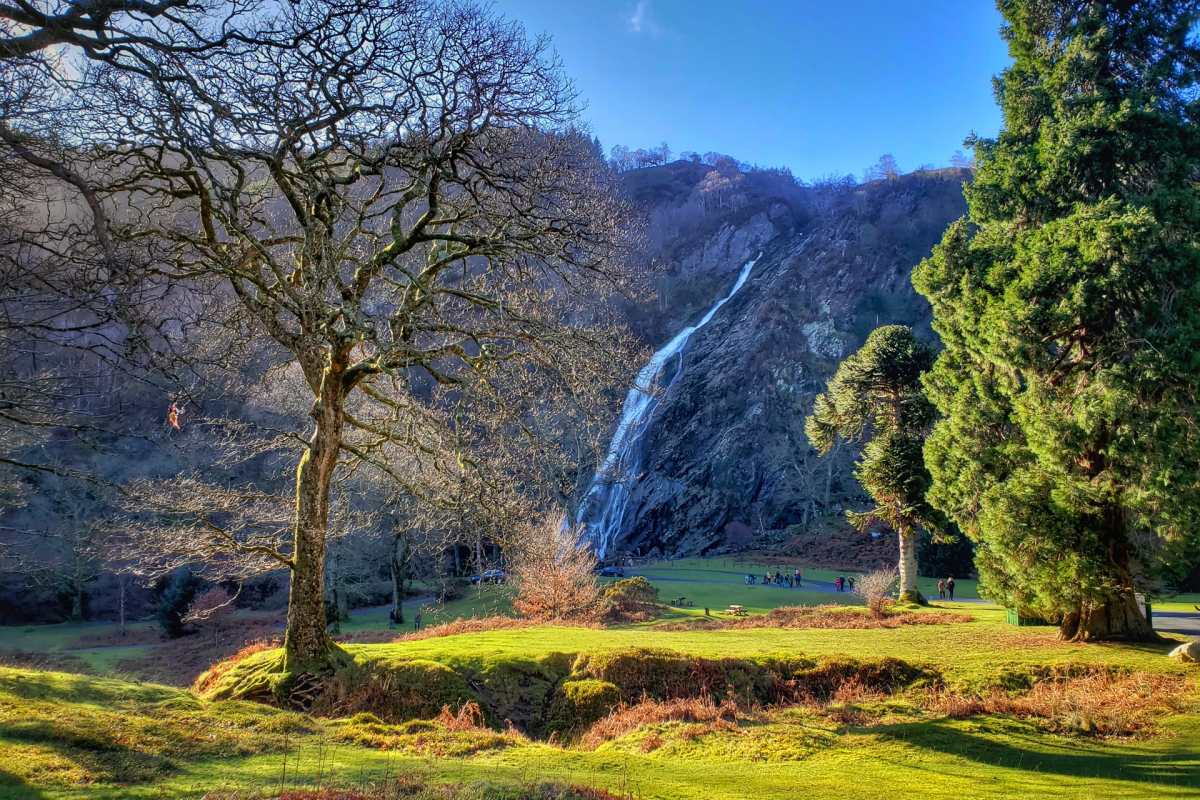
Located only 1-hour drive from Dublin and a few kilometers from the Powerscourt property and gardens, the area around the waterfall is equipped with picnic areas, barbecue facilities and children’s play areas.
You can easily approach the waterfall, you’ll be amazed by its power. There are also several walking trails from the waterfall where you can stroll along the small rivers and through the forest.
31. Slieve League
Located in Donegal, Ireland’s northernmost county, the Slieve League is the second highest cliff of all Europe! Less known than the Cliffs of Moher that I’ve mentioned previously, these massive cliffs that rise more than 600 meters above the Atlantic Ocean rank in Ireland’s best cliffs.
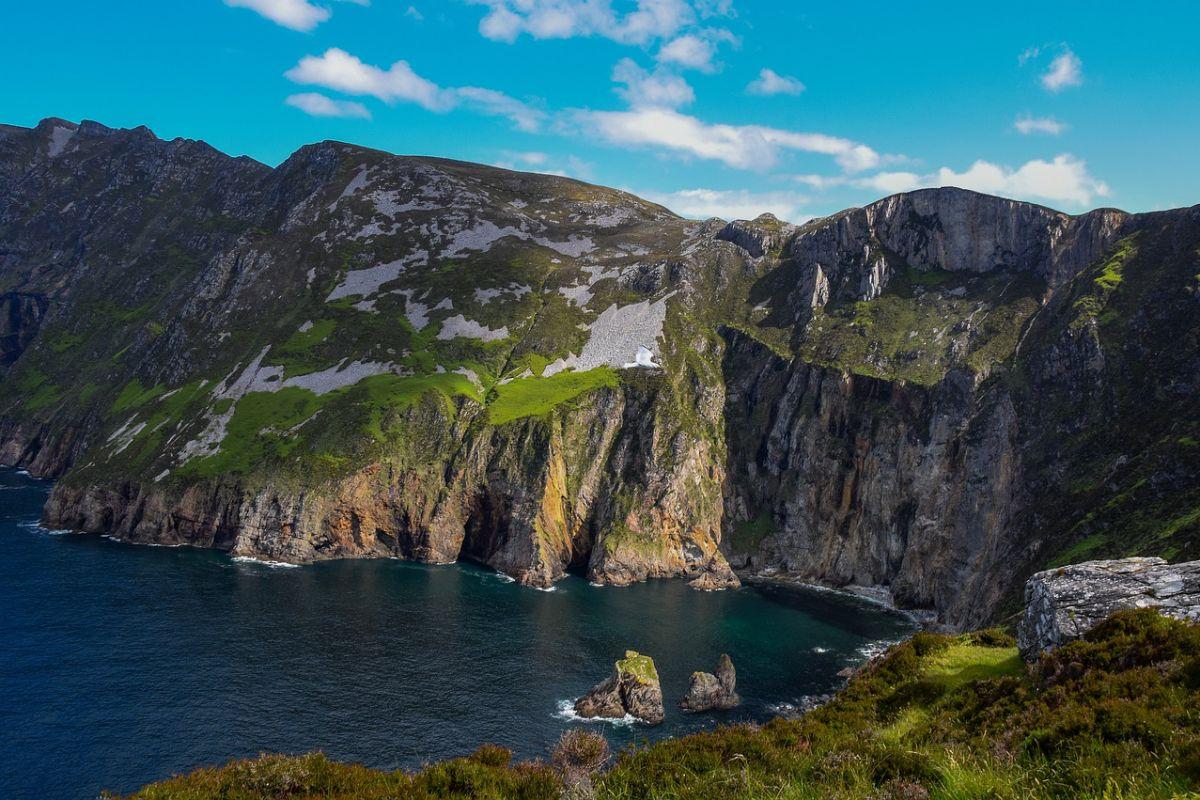
To discover the cliffs, there are 2 options: the hike by the mountains above the cliffs or the standard 20 minutes walk, ideal if you have little time. In both cases, you will have incredible panoramas of the cliffs that often turns golden, depending on the season you visit them.
Close to the Slieve League, there are many places to see including Ardara, the tweed capital! If you feel like discovering how tweed (the traditional Irish fabric) is made, you can visit the Hanna Hats factory that produces it by hand.
32. Burren National Park
Located in Clare County only 40min drive from the Cliffs of Moher, the Burren National Park is one of the most fascinating landscapes in Ireland, a desert of stone in a country where rain is not rare! Classified as a UNSECO heritage site, the Burren is a natural wonder visited by thousands of tourists every year.
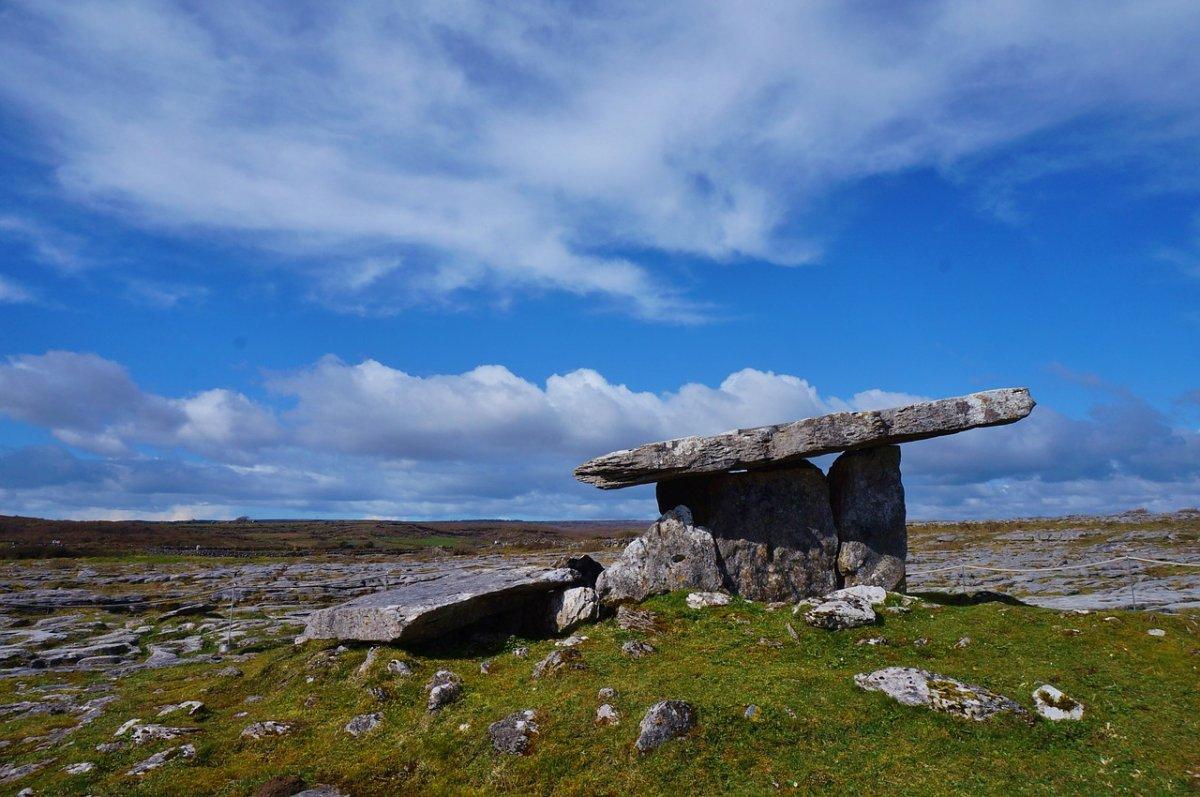
This huge rocky plateau stretching as far as the eye can see over 530 kilometers square offers a lunar landscape and an ideal habitat for animals, insects and birds of all kinds.
The Burren National Park doesn’t really have a star attraction but rather a singular setting, composed of rocks and limestone. Some places are nevertheless famous like the Dolmen of Poulnabrone or Doolin with its rocky beaches.
33. Aillwee Cave
Part of Burren National Park, Aillwee Cave is one of the largest accessible caves in Ireland. The cave if famous for its columns, stalactites, straws, stalagmites and flowstones, as well as underground rivers and waterfalls.
The cave was discovered in 1940 by a shepherd but it wasn’t explored until 1973. But inside, the geological formations are millions of years old!
If you want to visit the cave, don’t go alone and don’t stray from the paths, you might get lost. The cave is huge and the maze runs for dozens of kilometers at 10 meters below ground at least. You’ll also have to be warmly dressed as the temperature never exceed 10 C°.
34. Aran Islands
Located 18 kilometers off the west coast in County Galway, the Aran Islands form an archipelago of 3 islands: Inishmore (the largest and most touristy), Inishmaan and Inisheer. Being populated a very long time ago, funerary monuments dating from the Bronze Age have been found on Inisheer.
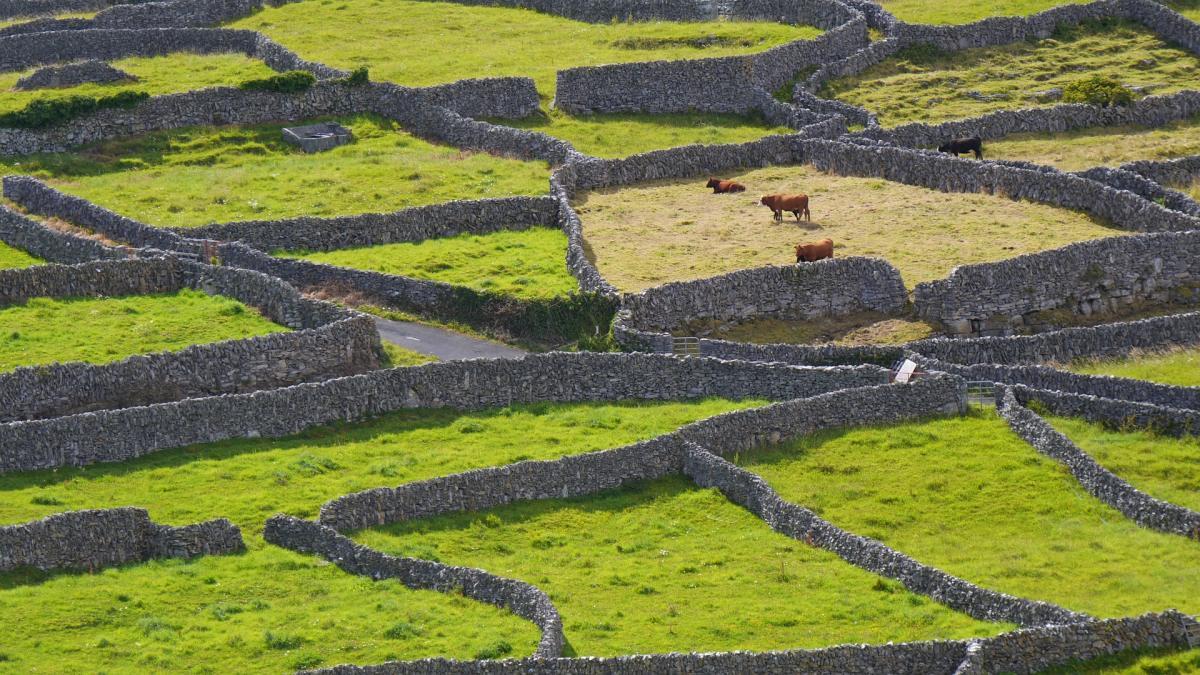
The legend says the Aran Islands were formed as a result of a severe storm that destroyed a spit of land in Galway Bay. But scientists associate the islands with an extension of Burren because of the great similarity between their soils.
If you visit these islands, you’ll discover the rural and traditional Ireland at its best where the Gaelic is still spoken. Dún Aonghasa (a prehistoric hill fort) and the Seven Churches are the main sites not to be missed there.
35. Spike Island
Located off the coast of Cork, Spike island has a dark history. Once called “Ireland’s hell” or “Hell on Earth”, this island was nevertheless designated “Europe’s best tourist site” in 2017, beating out the Eiffel Tower or the Coliseum.
Initially, the island was home to a 7th-century monastic site. But because of its strategic location, a prison was finally built there in 1640, then a fortress in 1770. During the 19th century, the Irish Alcatraz became the largest detention center in the world with 2,300 prisoners. About 1,200 of them would’ve lost their lives due to forced labor and deprivation.
Since its reopening to the public in 2016, Spike island has become a major tourist attraction and offers many activities in an exceptional setting where you can discover the fort as well as the living conditions of the prisoners.
36. Benbulbin
When driving through County Sligo in the north of Ireland, it’s hard not to notice the Benbulben mountain as it’s so massive. Standing over 526 meters high, this gigantic geological formation was formed about 320 million years ago.
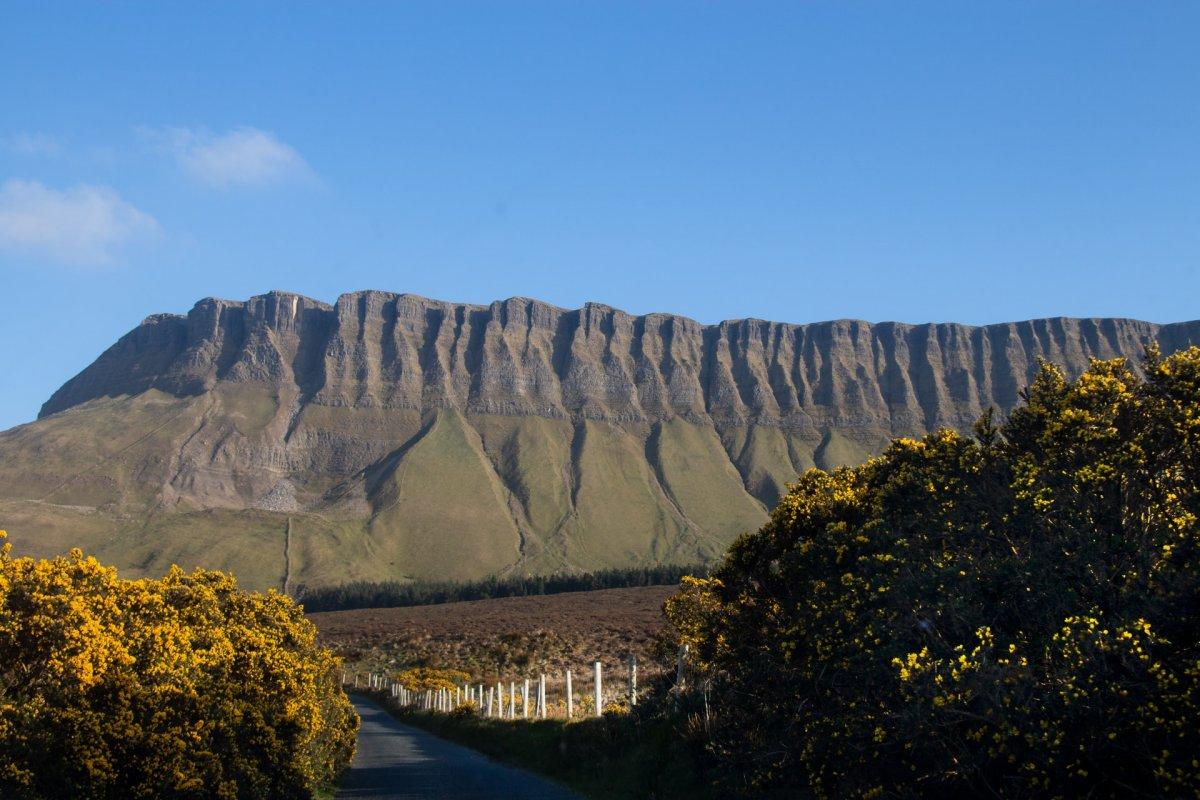
Benbulben is known to be a great spot for hiking and climbing (preferably on its south side). At the foot of the mountain, there are many walking trails that will take you through the local fauna and flora. Indeed, the mountain hosts a great variety of plants and some of them are unique to this part of Ireland. You’ll also be able to see wild animals on the trails, like foxes or hares.
If you’re brave and climb to the top of Benbulben, you’ll discover a wonderful view of County Sligo and its beaches that will leave you speachless!
37. Glenveagh National Park
Located in the very north of the country in County Donegal, Glenveagh National Park is the second largest national park in Ireland after Killarney.
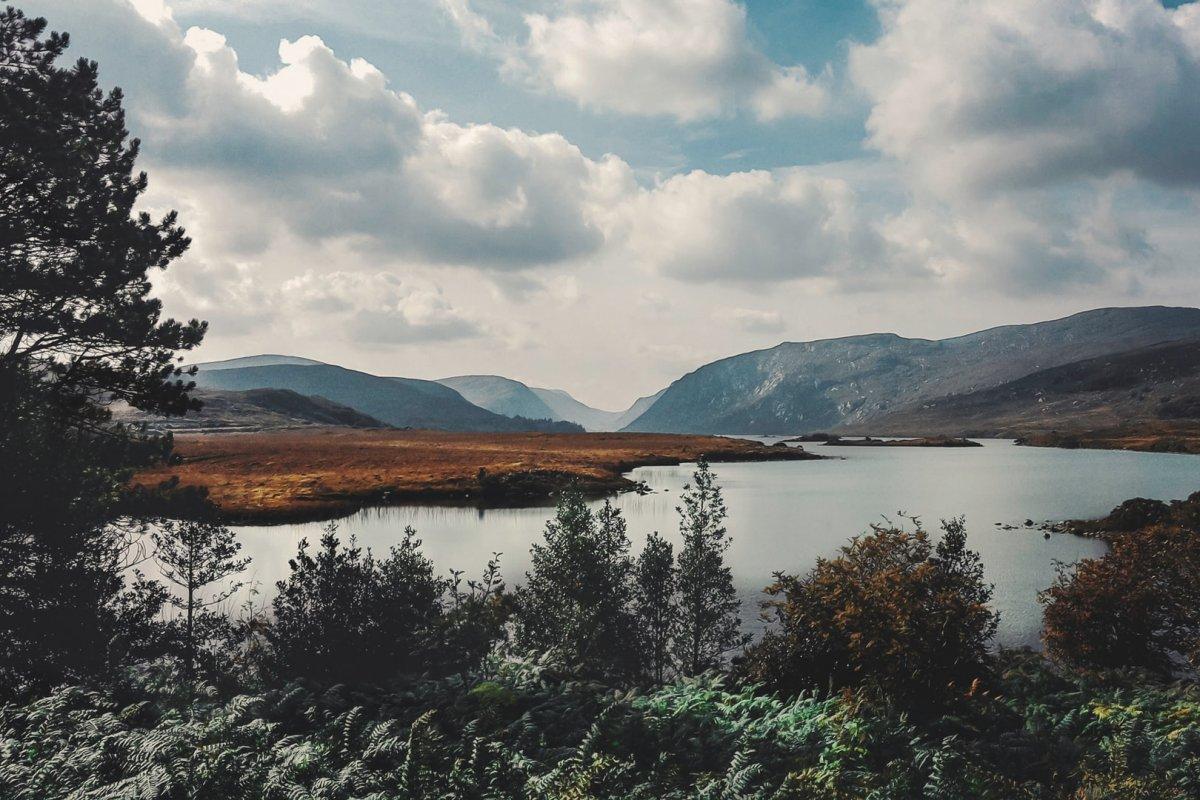
With its huge lakes surrounded by mountains, forests and deep valleys, Glenveagh National Park is a large protected nature reserve that spreads over nearly 170 kilometers. Here, you’ll find few iconic animals including golden eagles and red deer. All of this provides an ideal setting for hiking.
Glenveagh National Park includes the Lough Veagh valley, the Poisoned Glen valley and the Derryveagh Mountains. The park is also famous for the Glenveagh Castle, a castle built in the 19th century by John George Adair, a wealthy Irish-Scottish landlord.
38. Glendalough
Beautifully located near the village of Laragh in the heart of the Wicklow Mountains south of Dublin, Glendalough is a natural wonder that welcomes thousands of hikers every year.
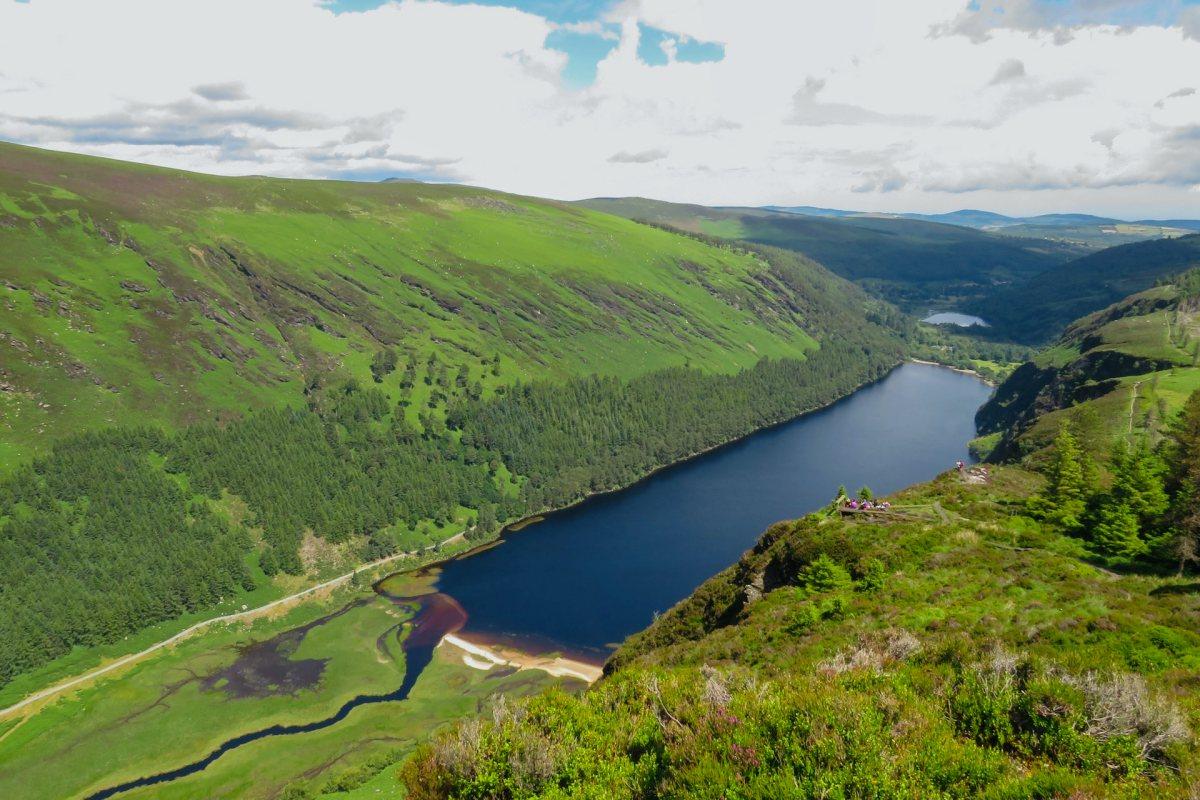
Glendalough means “valley of 2 lakes” in Irish for a reason: the valley is indeed composed of 2 lakes, Lower Lake and Upper Lake both contrasting with the surrounding green plains.
In the heart of this amazing natural setting, there’s a small hamlet that is home to the ruins of a monastery dating back to the 6th century. Close to the monastery, visitors can discover the famous round tower built by the Vikings overlooking the 2 lakes from its 33 meters height, as well as the cathedral and the cemetery.
39. Clew Bay
Located in County Mayo off the town of Westport on the northeast coast, Clew Bay is one of the most beautiful bays in Ireland. The bay is said to have as many islands as there are days in the year.
These hundreds of islets are actually submerged drumlins overlooked by Croagh Patrick, Ireland’s holy mountain which is one of Europe’s most famous pilgrimage sites. Some pilgrims climb the mountain barefoot, in memory of St. Patrick who spent 40 days and nights fasting on the summit over 1,500 years ago. From the top of Croagh Patrick, the view of Clew Bay is simply outstanding and has always inspired the hikers and tourists.
One of the best ways to explore the bay is to drive along it and then follow the small roads to the small picturesque villages with colorful houses built along beautiful beaches. The views of the islands and the sea are fabulous.
40. Dun Bristé
Also located in County Mayo on the northeast Atlantic coast, Dun Bristé is a piece of cliff that has broken away from Downpatrick Head, a set of dramatic cliffs.
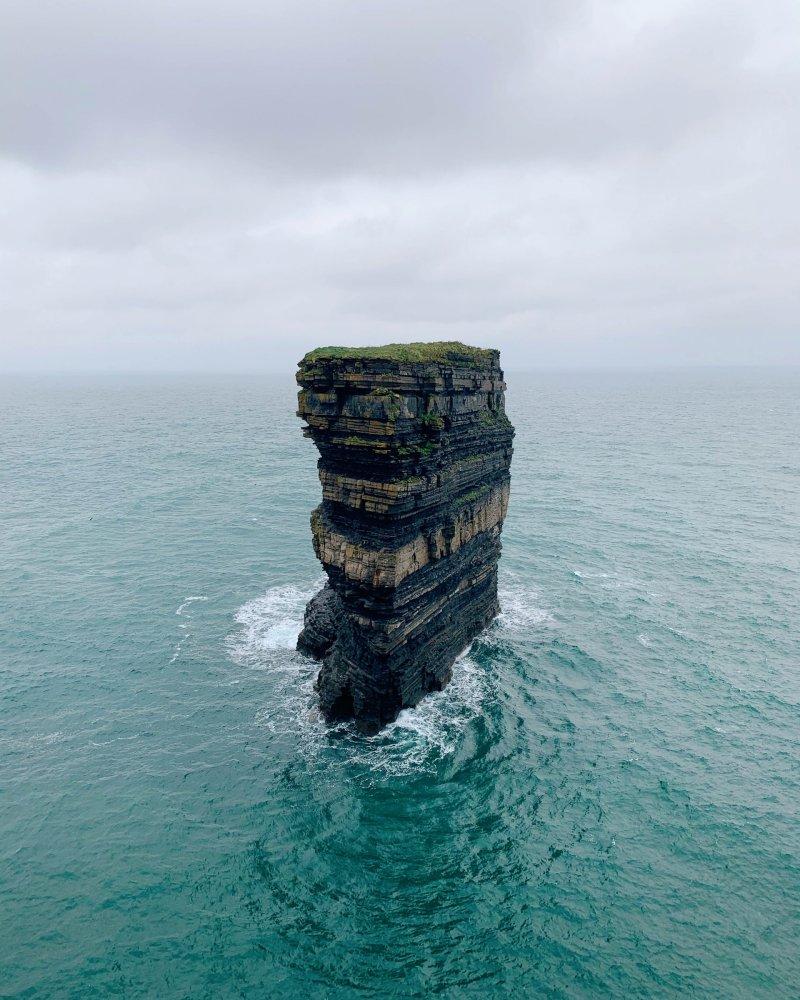
This 50-meters high cliff lost in the ocean less than 5km from the coast offers a spectacular scenery that will delight both photographers and Instagramers.
As you can expect from the Irish, a legend surrounds the Dun Bristé. It says that the rock was formed after St. Patrick prayed God to get rid of the ogre that used to live there, because of its bad temper. The ground collapsed around the ogre who found himself stuck on the rock of Dun Bristé and cut off from the world!
Hourray! You’ve made it to the end! 🎉
If you want to bookmark some of them, you’ll find my personal map right below to help you.
Map of the Famous Landmarks of Ireland
To get the free map of the famous Ireland landmarks, simply click on the image below to open it in Google Maps. Then click on the “star” icon to save it to your own maps.
I hope you could’ve completed your Ireland bucket list thanks to this guide. If perhaps you’d like to add more Ireland and Northern Ireland spots, you should check these guides:
Loved this post? Share it with your friends by using the buttons below, I’m sure they’ll love it! 😊
Travel Tools
Use any of our recommended links below to book your trip. You pay the same, and we earn a small fee; a great way to support us!
Pin this to Pinterest!
Enjoyed this guide? Then help a fellow traveler and pin it! They'll most definitely love you for it, 100% guarantee.
